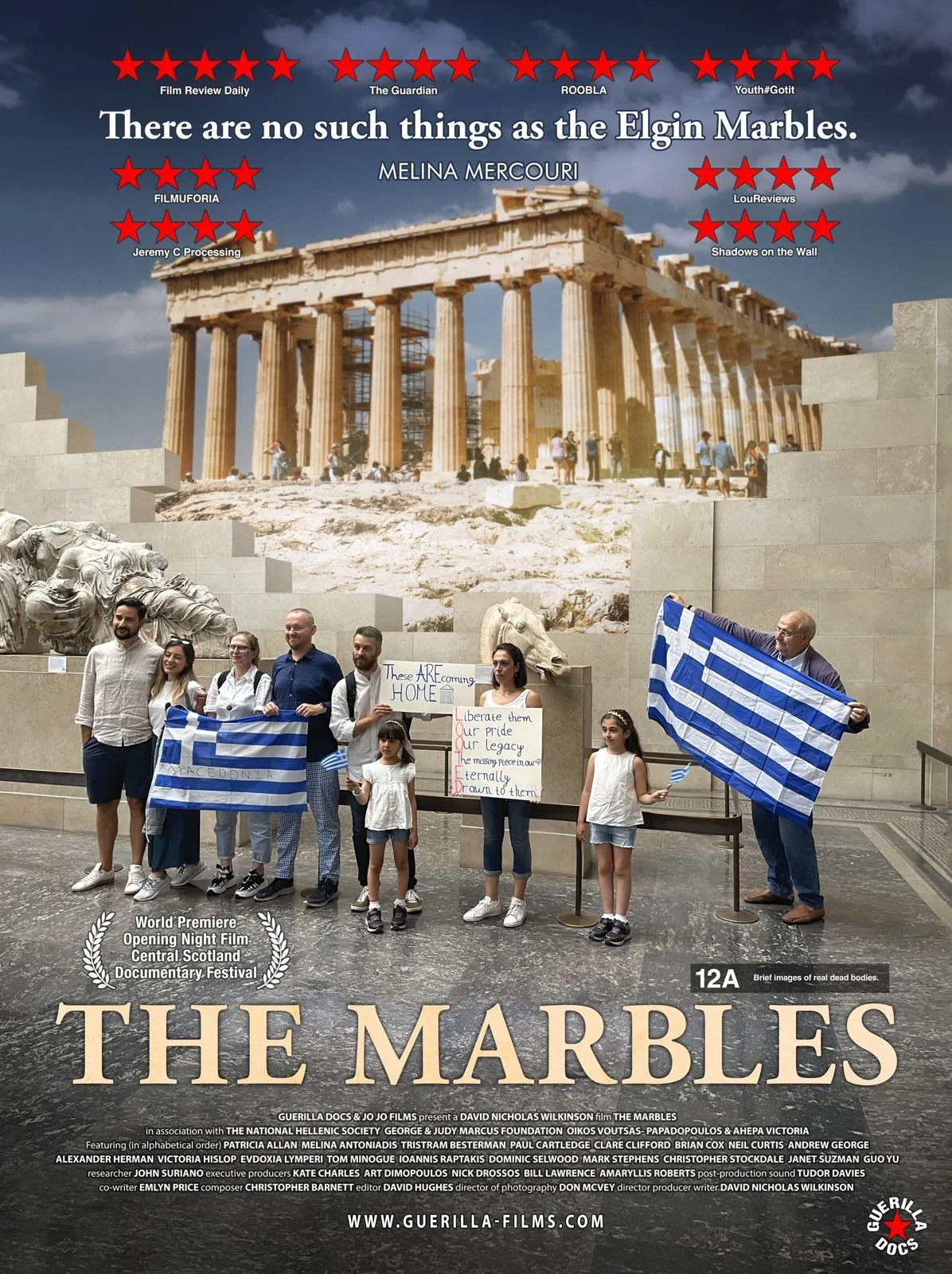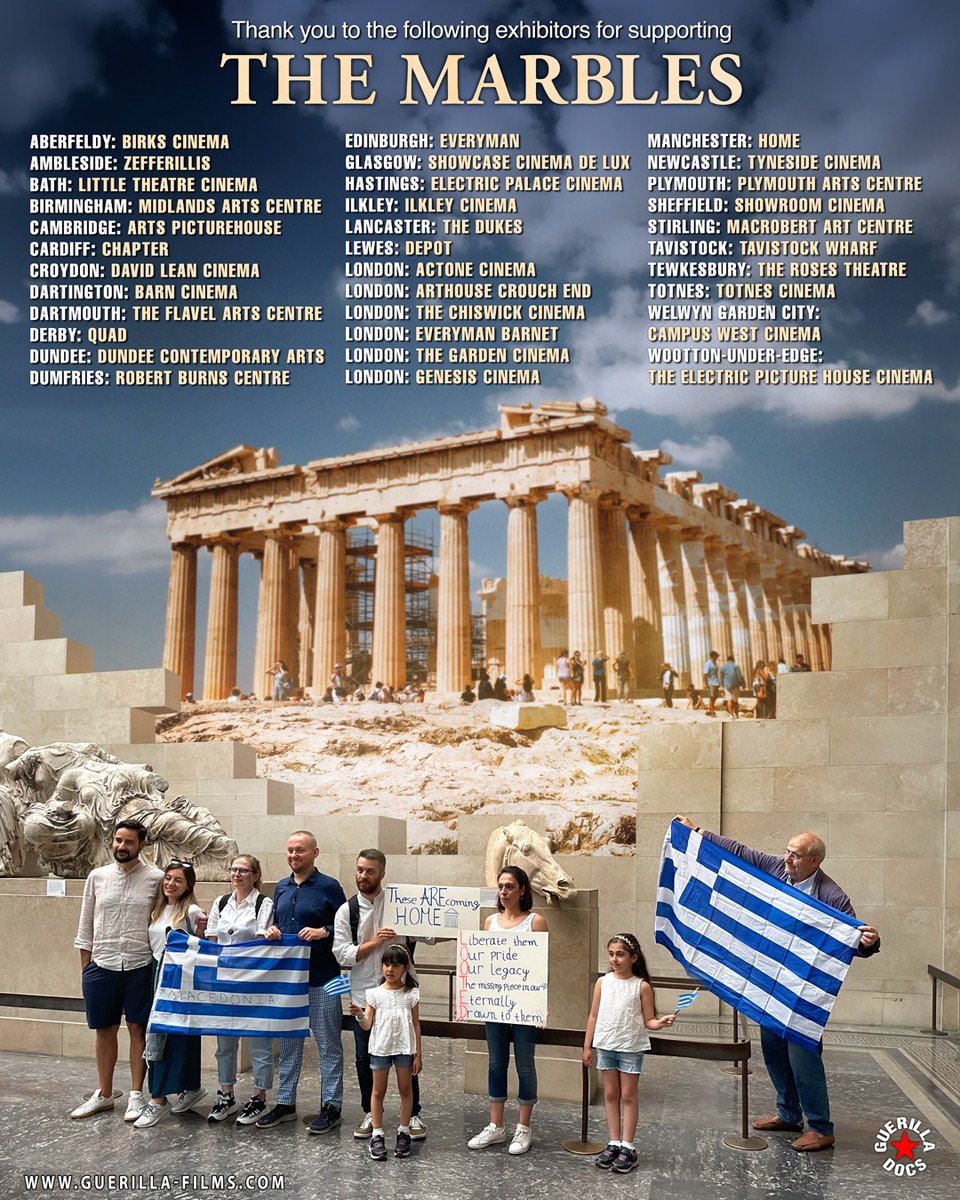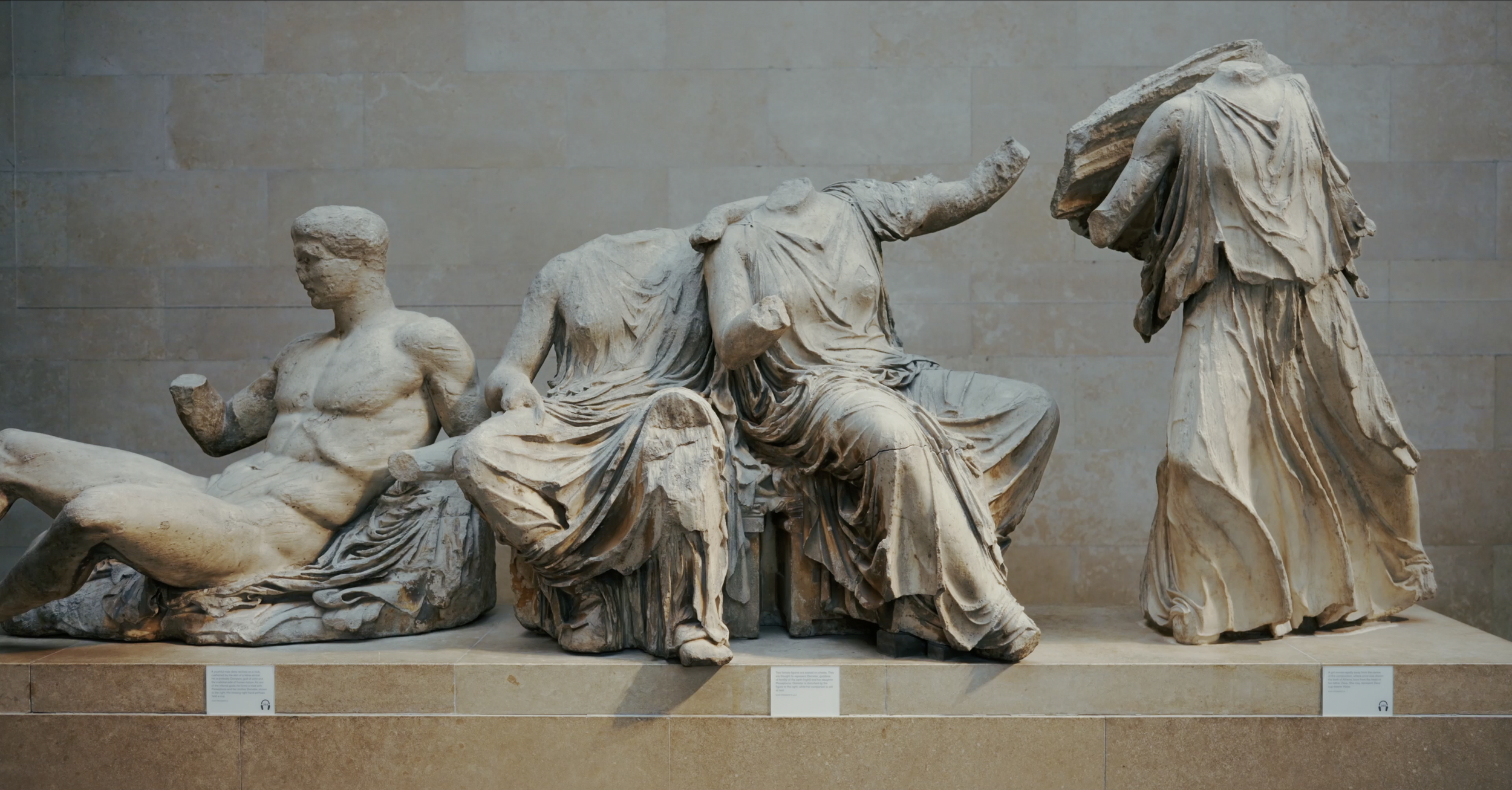
The Marbles
★★★★★ "David Nicholas Wilkinson’s documentary makes a strong case for the return of the Parthenon Sculptures to Greece." — Michael Darvell, Film Review Daily
│
★★★★ "David Wilkinson’s personal exploration of the issues open-mindedly examines both sides of a contentious political debate." — Peter Bradshaw, The Guardian
│
★★★★ "Wilkinson is both our guide and proxy, a tireless on-camera investigator." — The Financial Times
│
★★★★ "I found the whole thing a useful primer on both the expected subject and the wider context of cultural artefact theft." — Jeremy Clarke, Jeremy C. Processing
│
"At stake is more than stone — it is the soul of heritage itself.” — Close-Up Film
│
★★★★ "An incredibly thought-provoking and powerful documentary" — Youth #Gottit
│
★★★★ "its real power lies in its refusal to simplify." — LouReviews
│
★★★★ "well-crafted documentary." — Meredith Taylor, Filmuforia
│
★★★★ "this documentary can get anyone interested and animated" — Roobla
│
★★★★ "this fascinating documentary grapples with the thorny issue of museums repatriating artefacts to their home nations" — Rich Cline, Shadows on the Wall
│
★★★★★ "David Nicholas Wilkinson’s documentary makes a strong case for the return of the Parthenon Sculptures to Greece." — Michael Darvell, Film Review Daily │ ★★★★ "David Wilkinson’s personal exploration of the issues open-mindedly examines both sides of a contentious political debate." — Peter Bradshaw, The Guardian │ ★★★★ "Wilkinson is both our guide and proxy, a tireless on-camera investigator." — The Financial Times │ ★★★★ "I found the whole thing a useful primer on both the expected subject and the wider context of cultural artefact theft." — Jeremy Clarke, Jeremy C. Processing │ "At stake is more than stone — it is the soul of heritage itself.” — Close-Up Film │ ★★★★ "An incredibly thought-provoking and powerful documentary" — Youth #Gottit │ ★★★★ "its real power lies in its refusal to simplify." — LouReviews │ ★★★★ "well-crafted documentary." — Meredith Taylor, Filmuforia │ ★★★★ "this documentary can get anyone interested and animated" — Roobla │ ★★★★ "this fascinating documentary grapples with the thorny issue of museums repatriating artefacts to their home nations" — Rich Cline, Shadows on the Wall │
The controversy surrounding the Parthenon Marbles
centres entirely on their initial acquisition and their current location in the British Museum. Since Lord Elgin first offered them to the British state, numerous British citizens have enthusiastically called for their return to Athens.
SYNOPSIS
THE MARBLES is a compelling new documentary examining one of history's most controversial cultural disputes—the removal of the Parthenon Marbles—and the ongoing campaign to return them to Greece. From imperial acquisition to modern-day advocacy, this is the story of heritage, identity, and justice.
In 1801, Lord Elgin controversially removed half the Parthenon's sculptures, sparking a backlash from his contemporaries that continues today. What followed was a 200-year diplomatic battle between Greece and Britain over cultural patrimony. When respected actress and politician Melina Mercouri challenged the British Museum in 1983, she transformed the issue into an international cause that redefined how we think about cultural ownership.
This thoughtful documentary, filmed over five years starting on the 200th anniversary of Greek independence, reveals the complexities of museum ethics, cultural policy, and the competing claims surrounding ancient artefacts. From Athens to London, it’s a tale of empire, resistance, and redemption—with Scotland emerging as an unlikely hero.
The debate continues to evolve, raising fundamental questions about the rightful ownership of ancient treasures. The question isn't just about marble sculptures—it's about how we value and preserve cultural heritage in a post-colonial world.
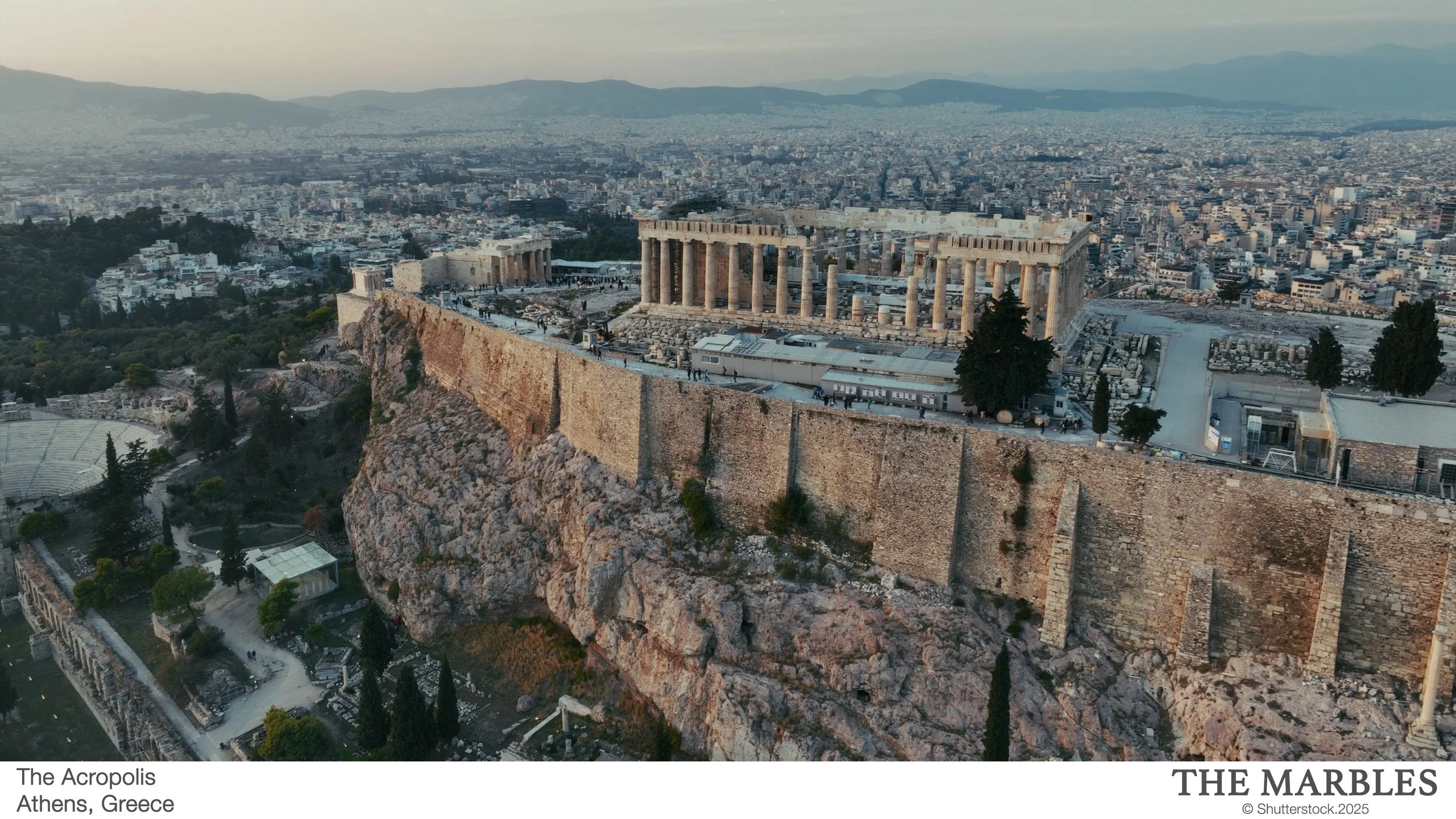
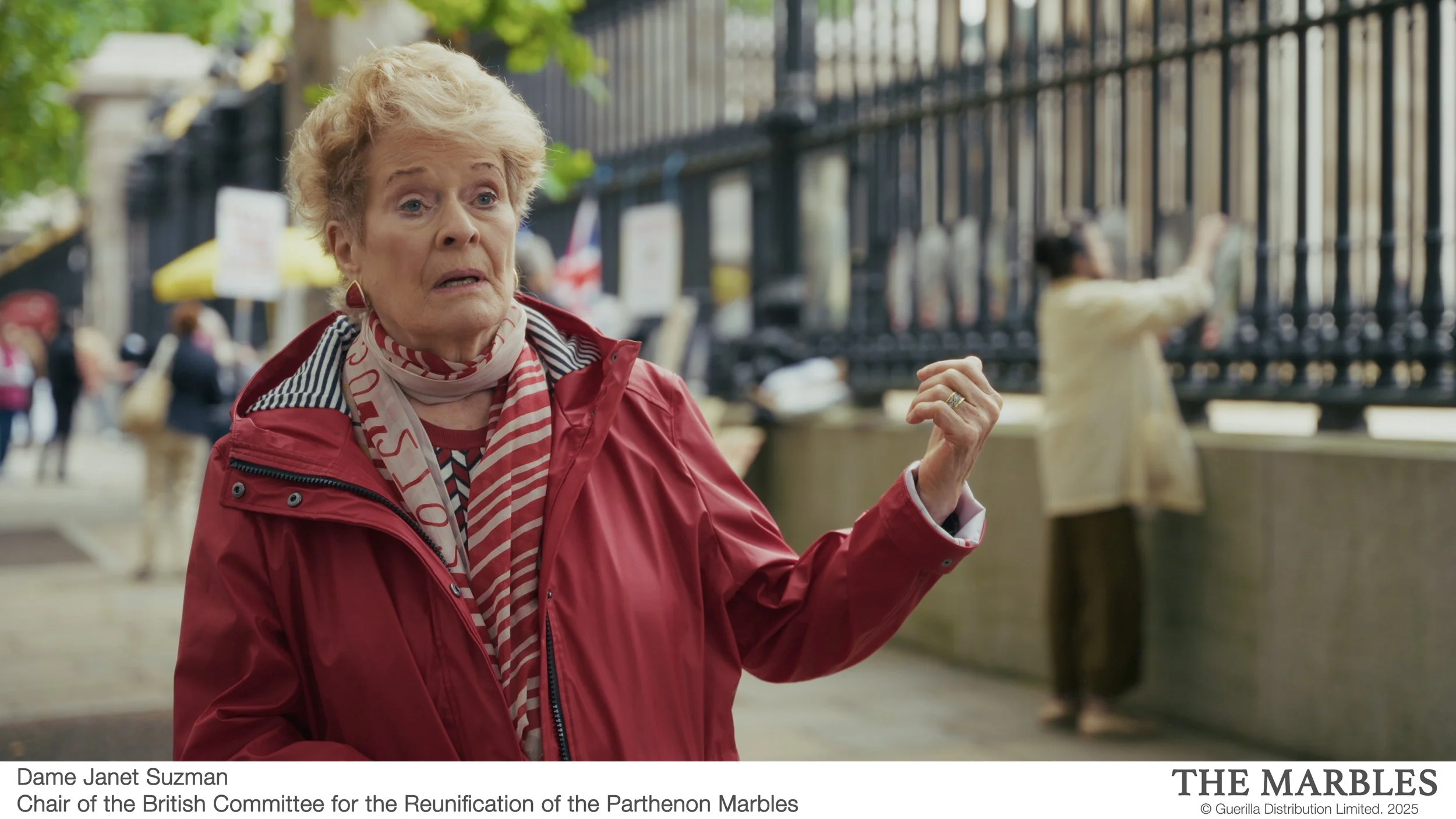
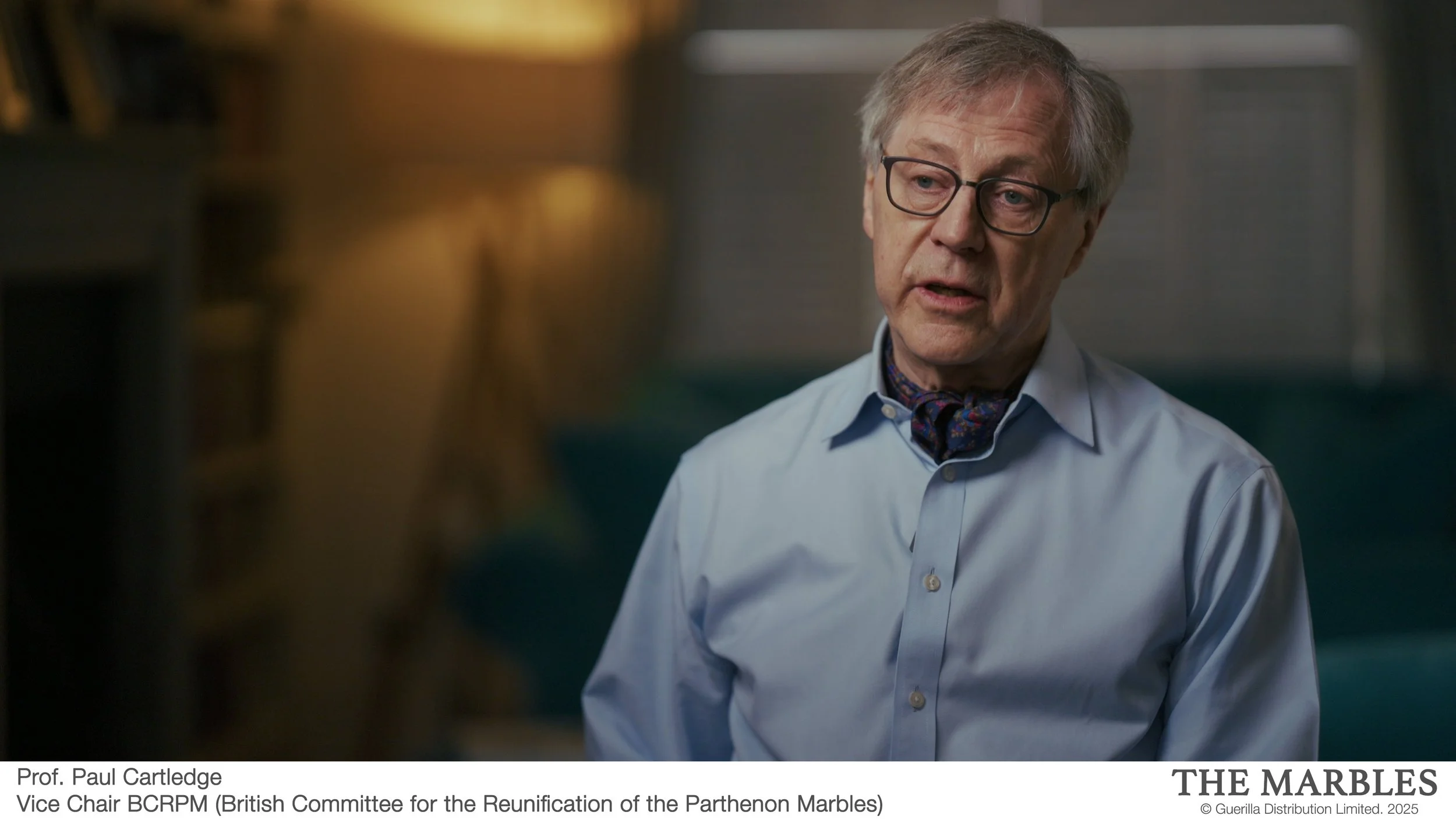
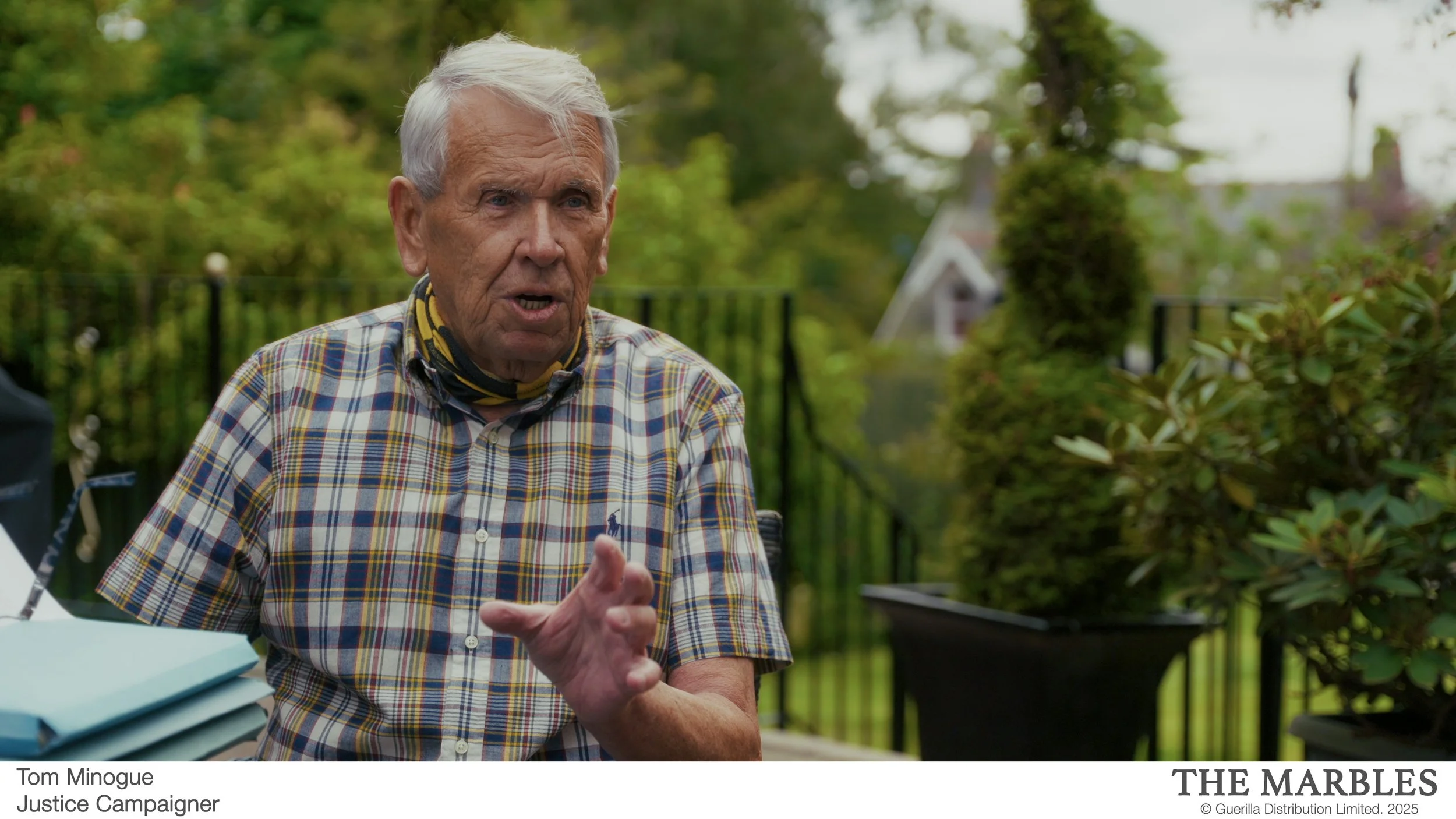
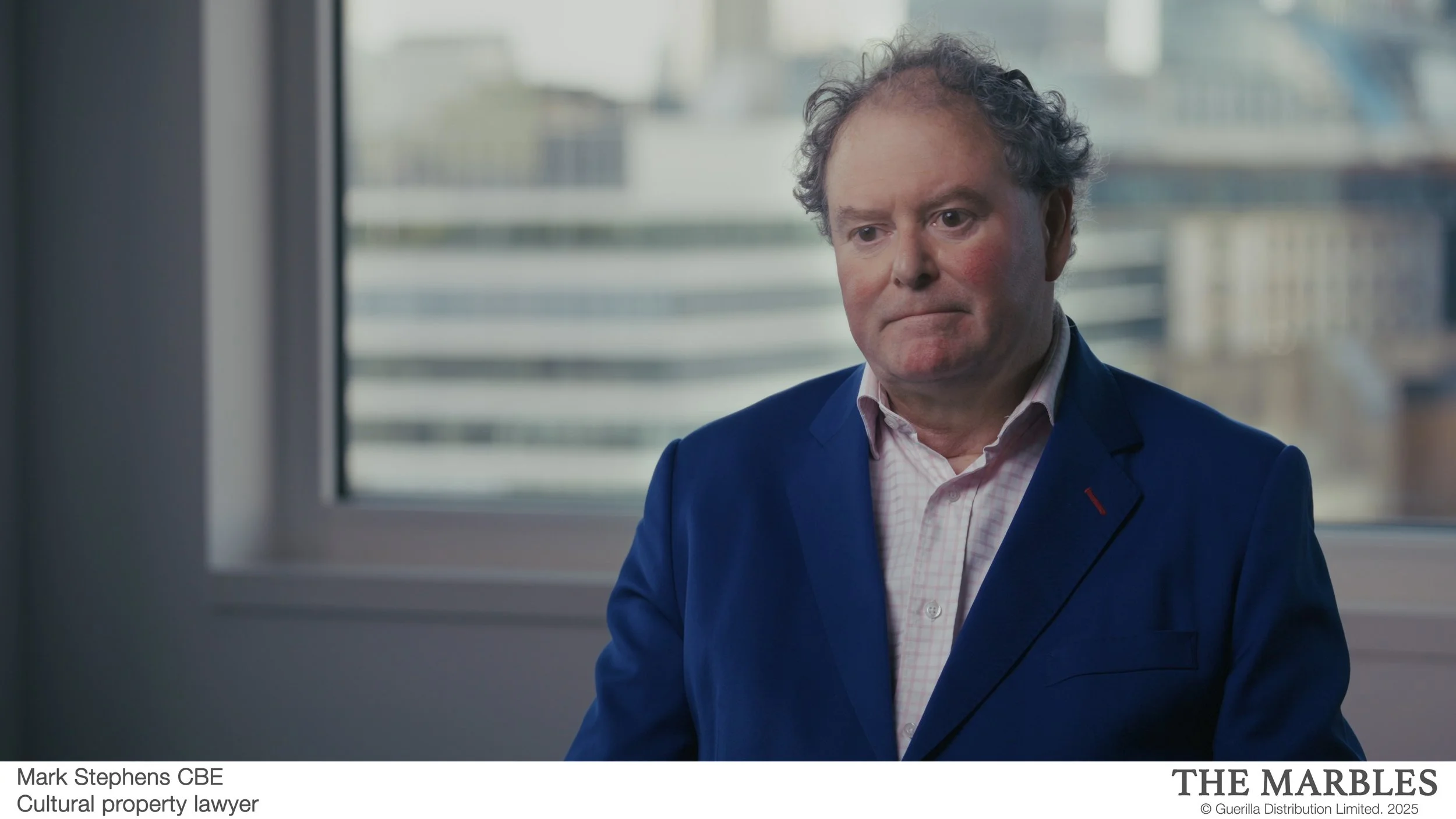
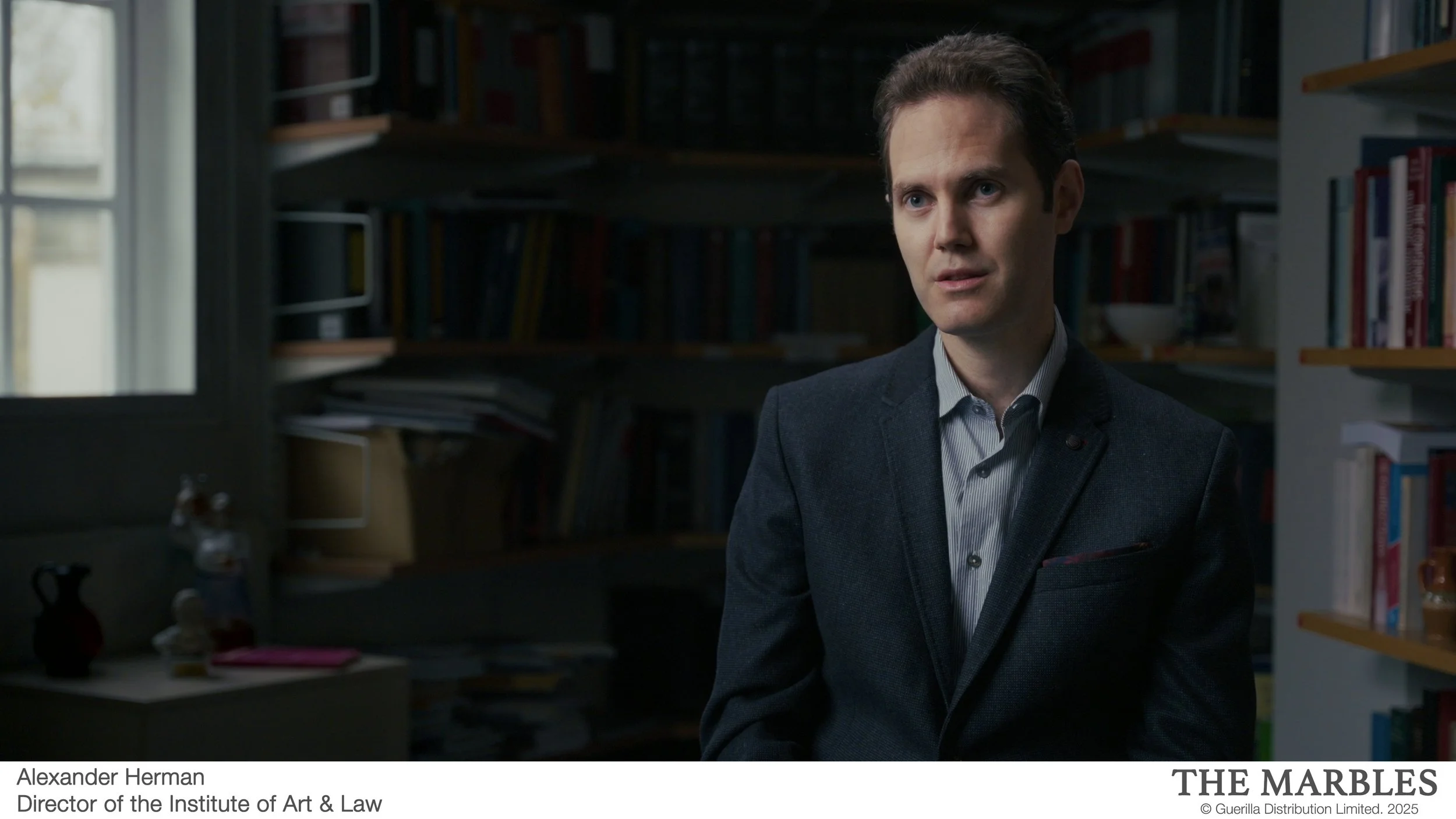
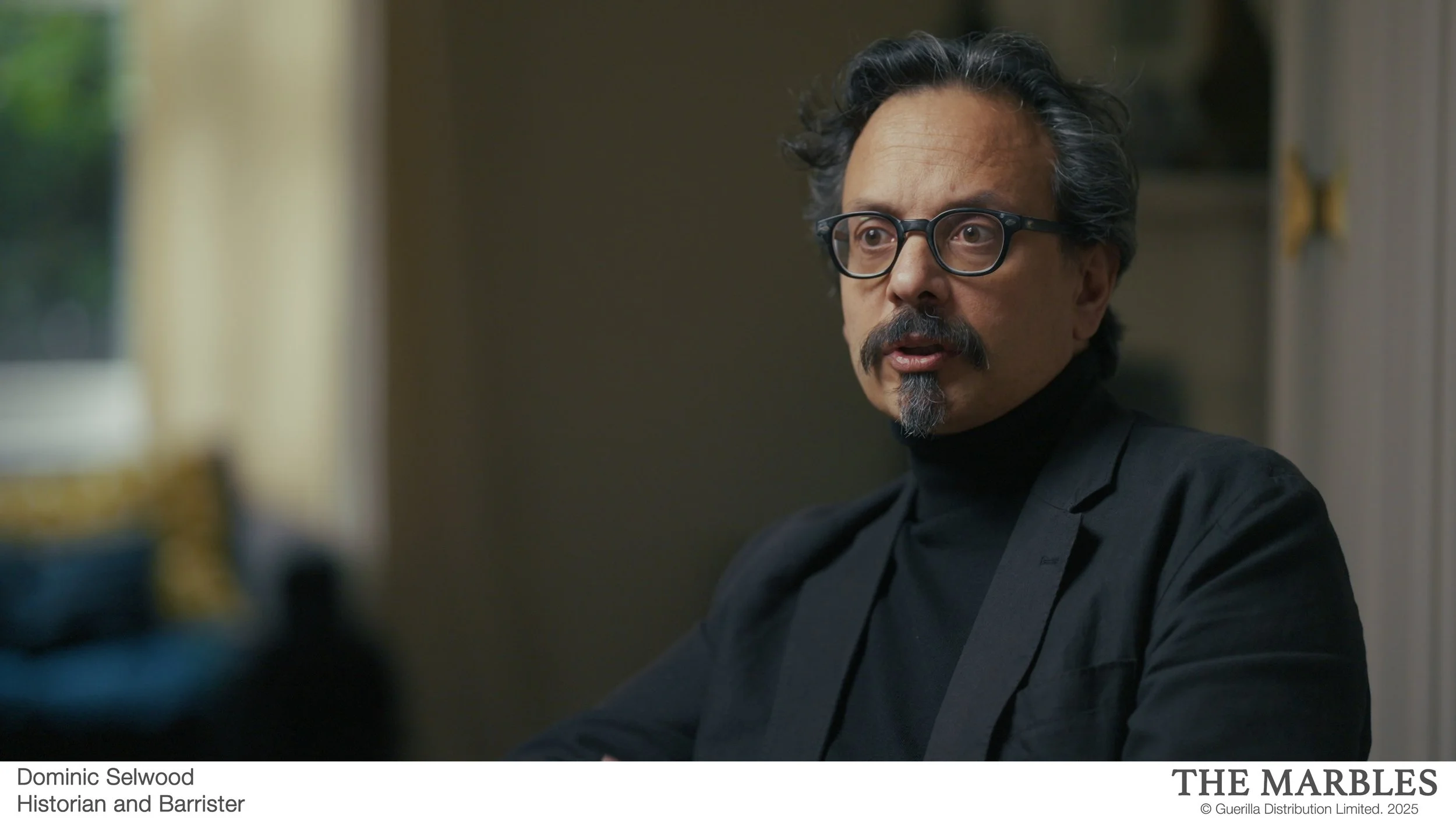
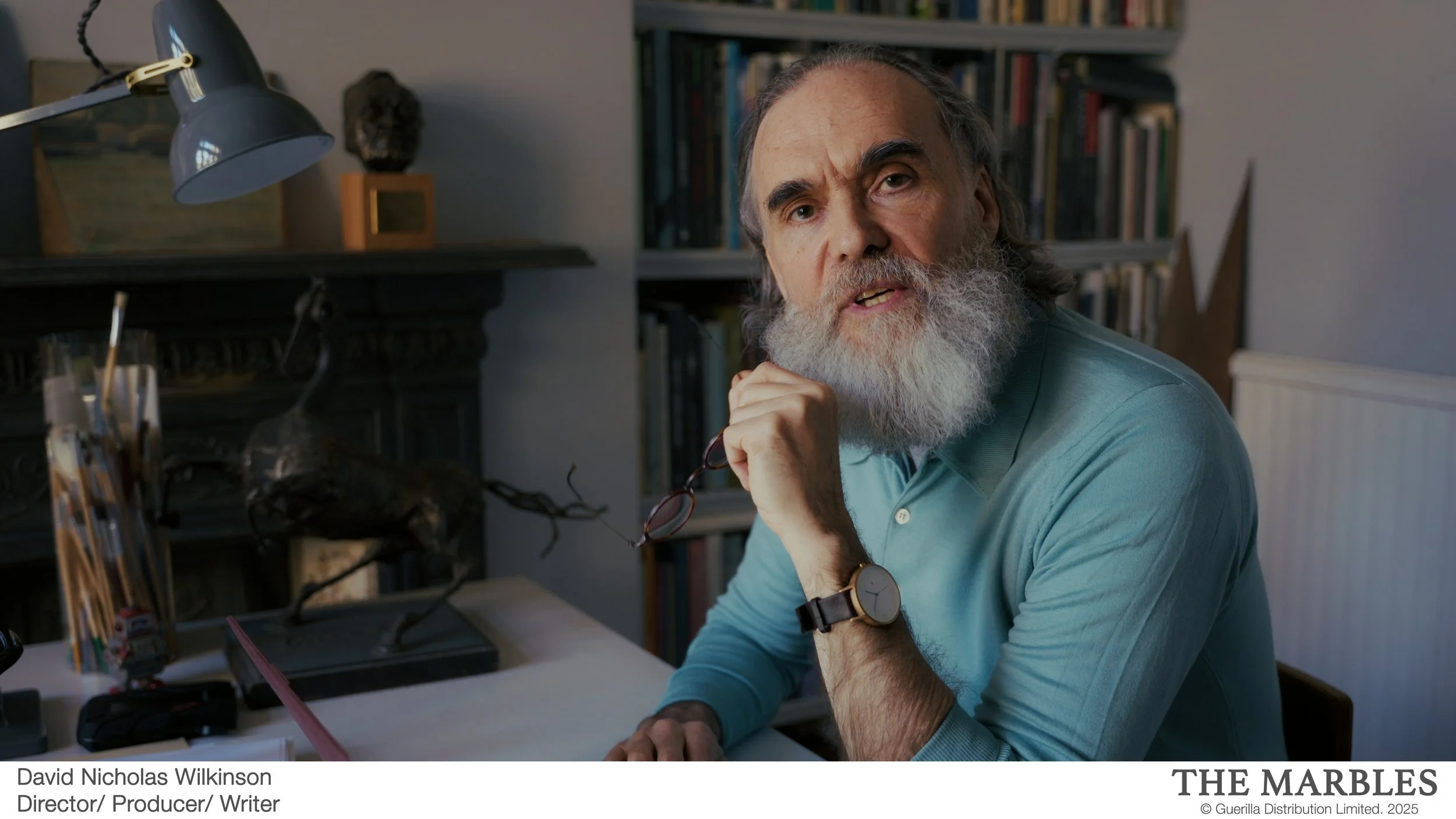
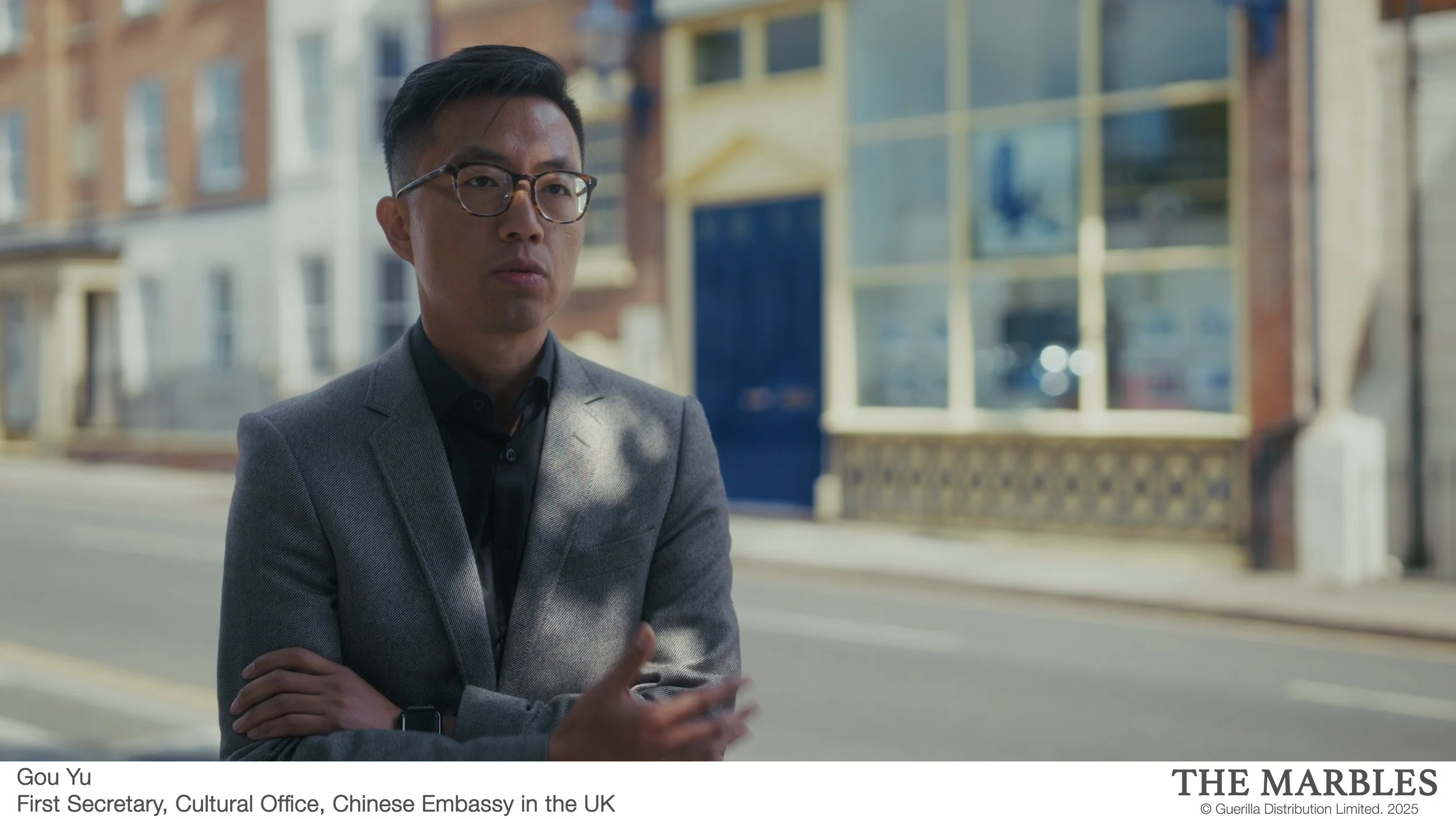
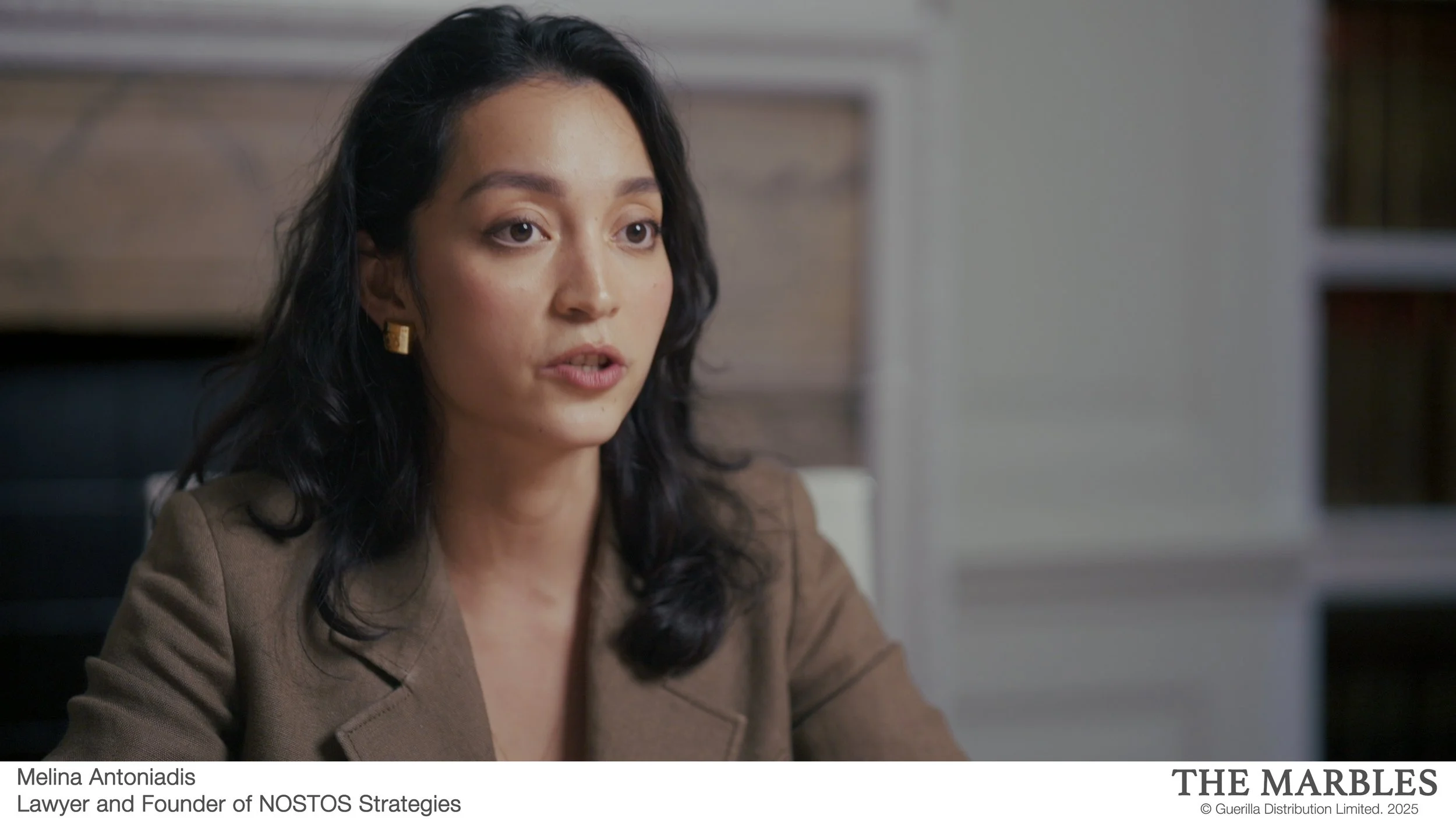
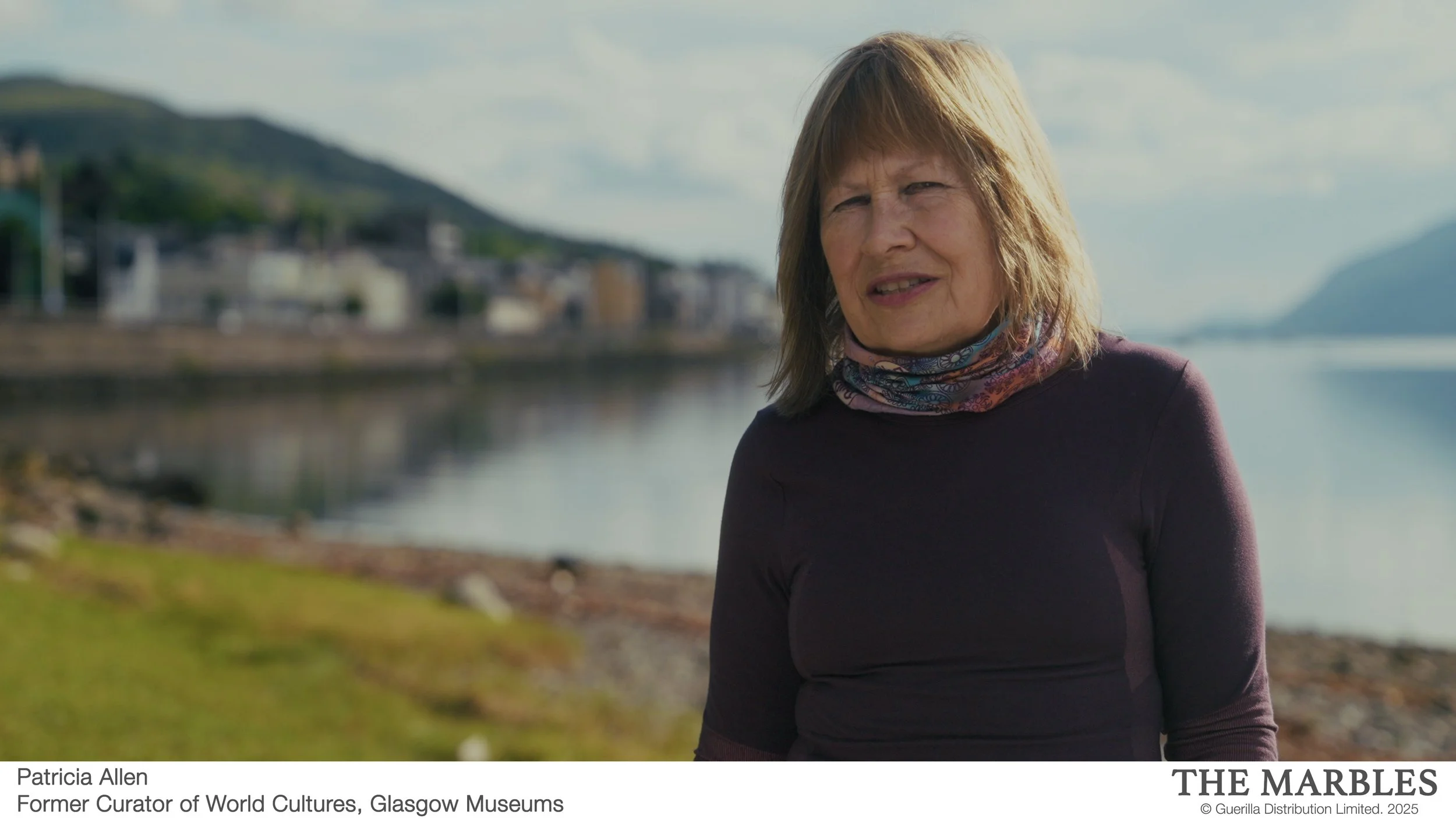
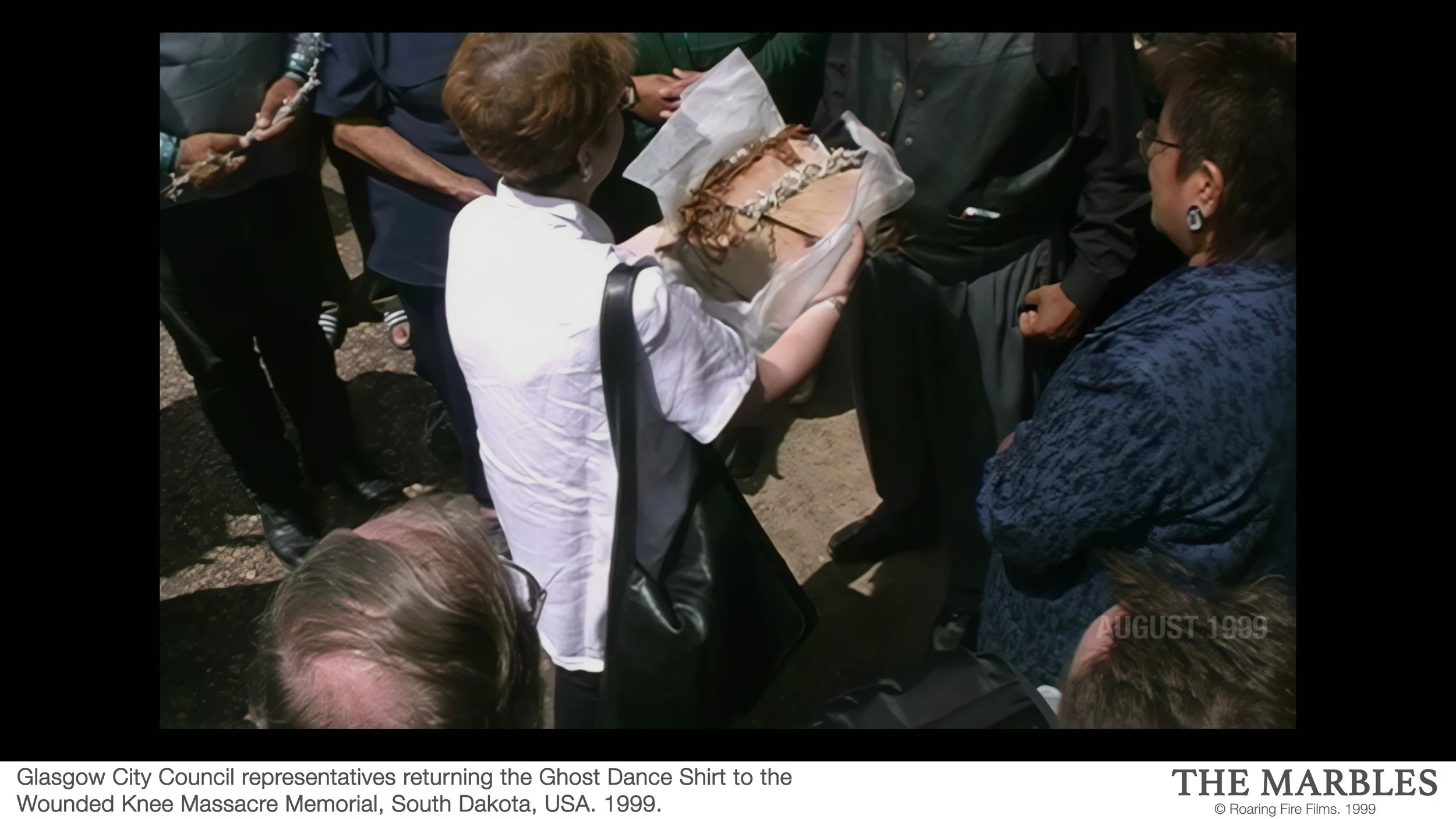
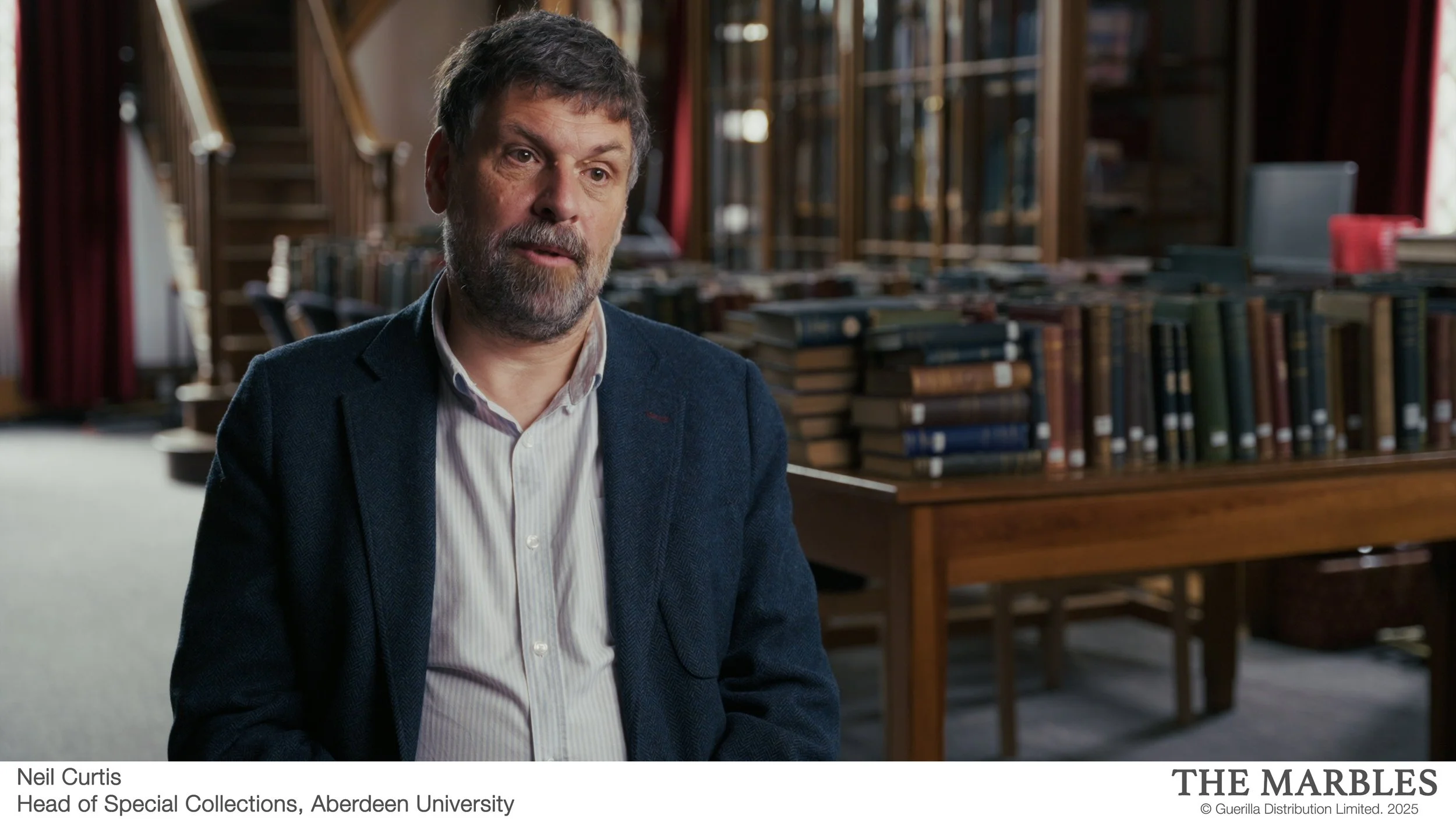
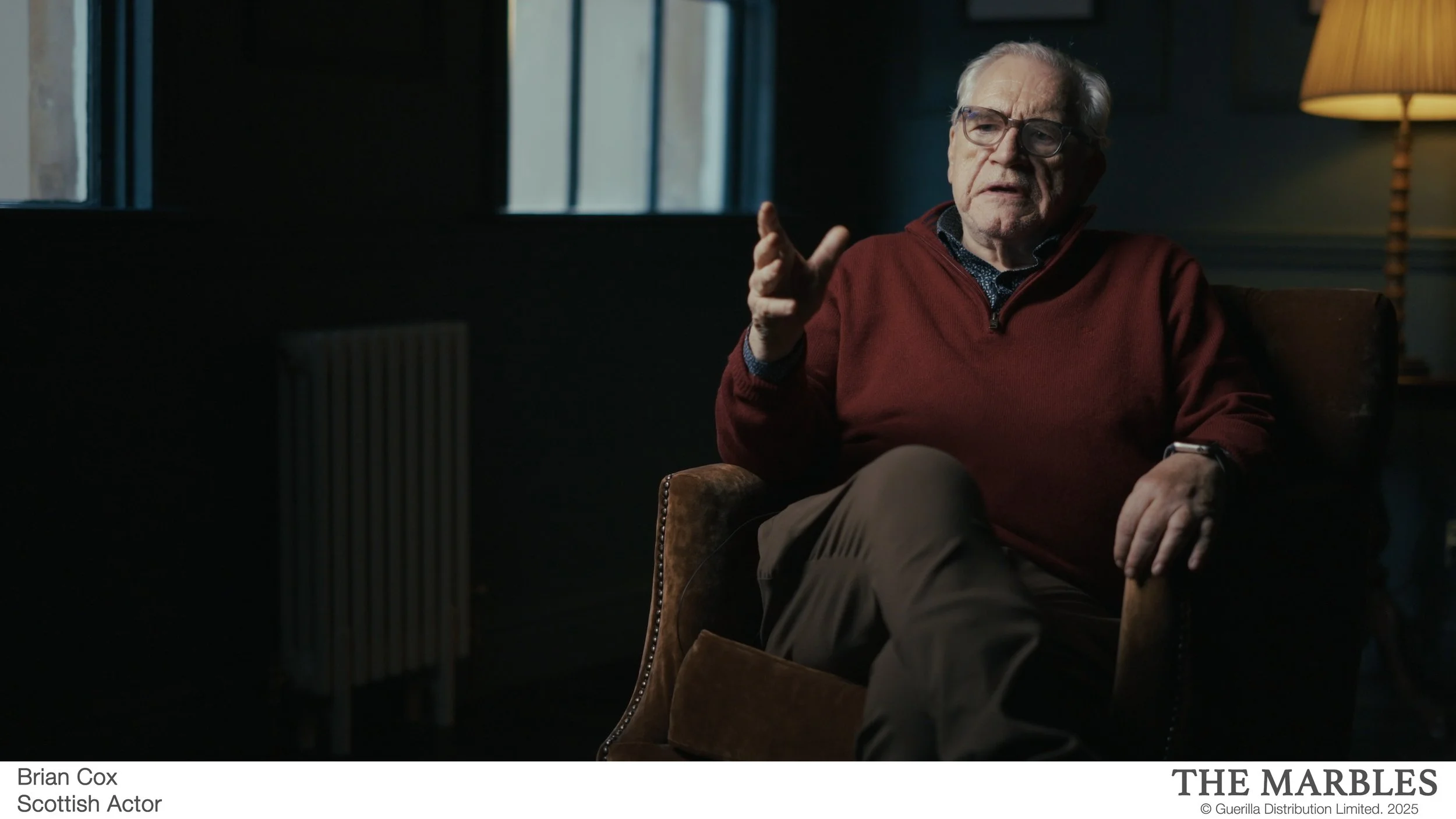
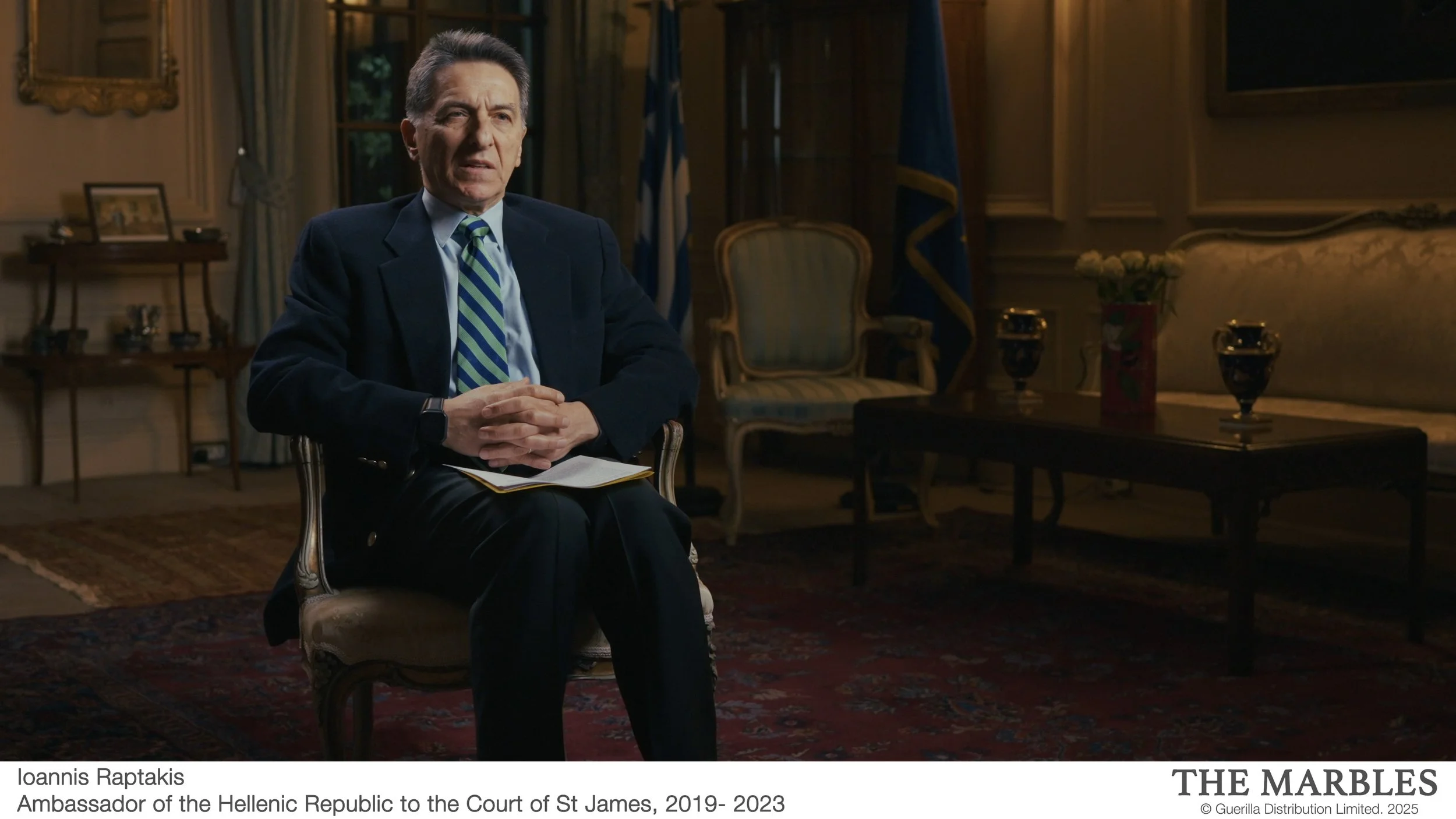
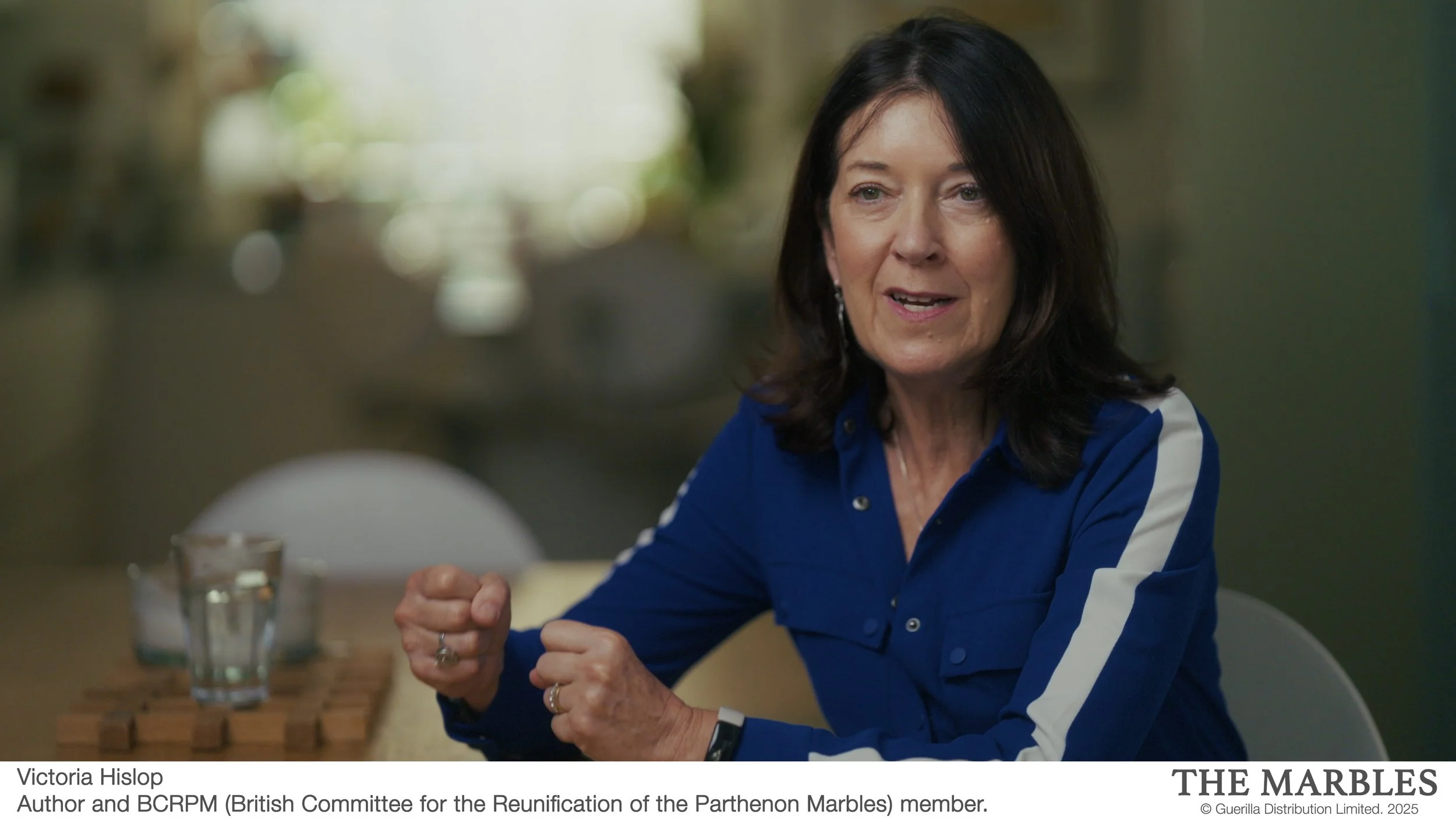
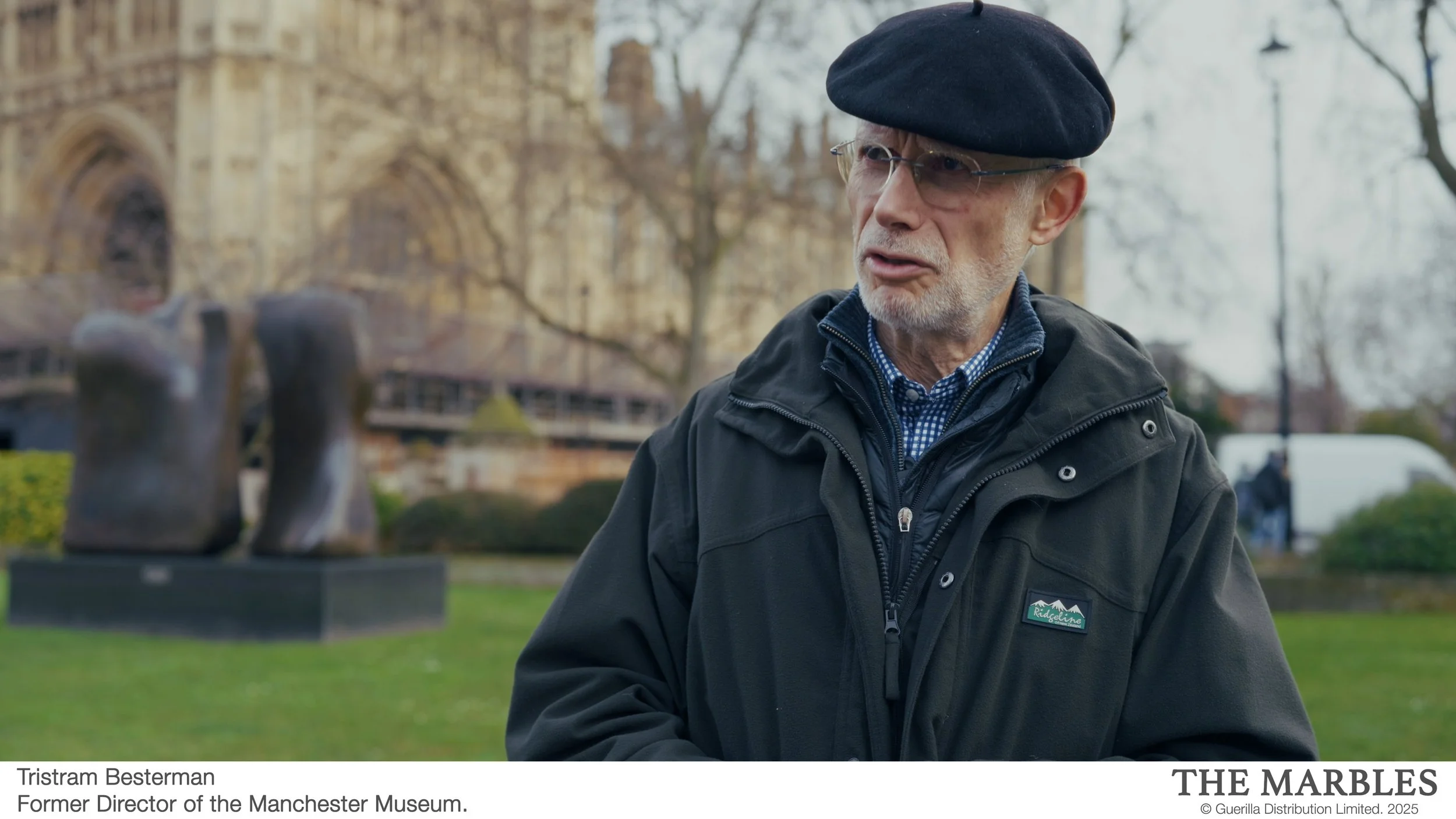
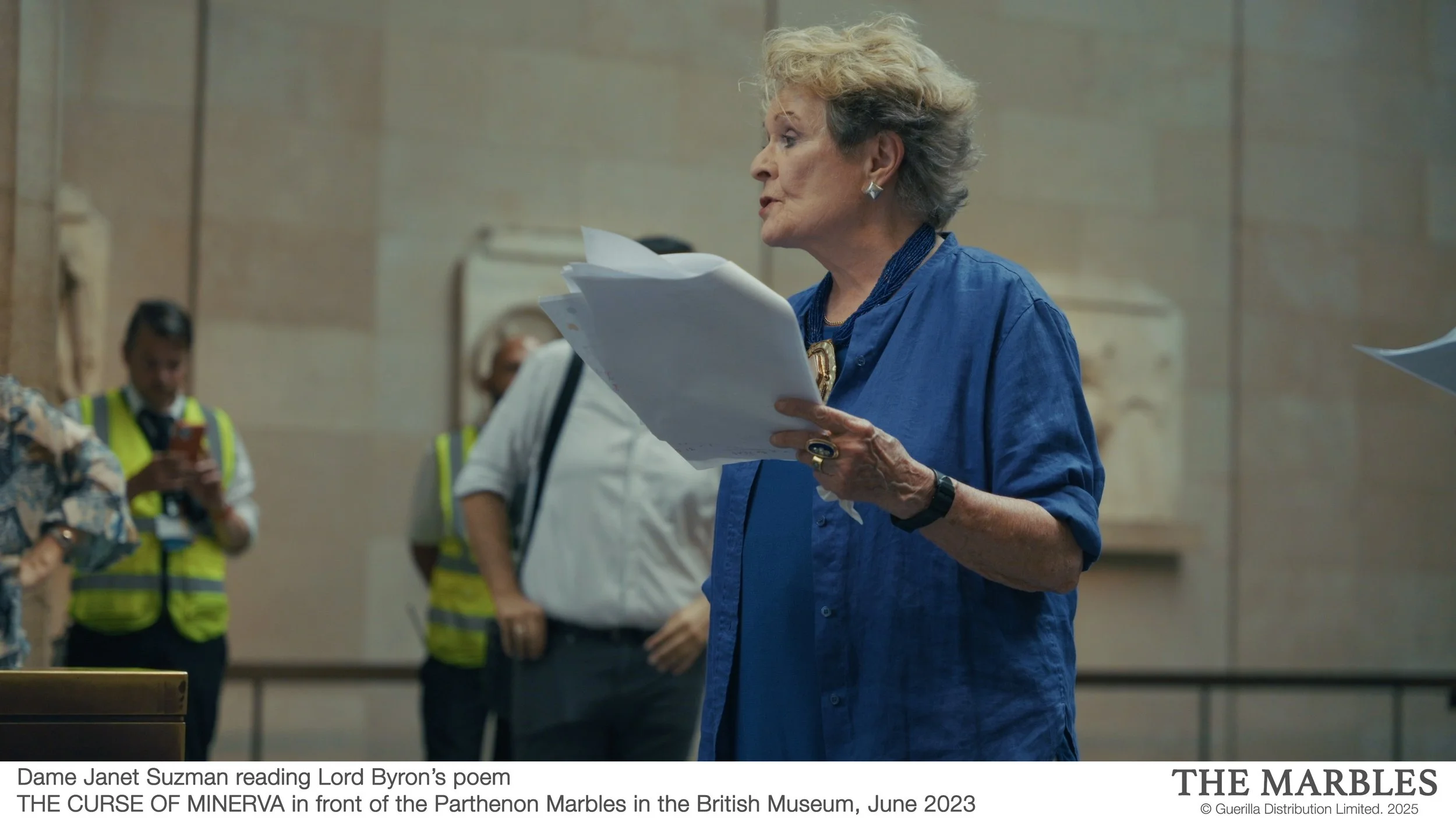
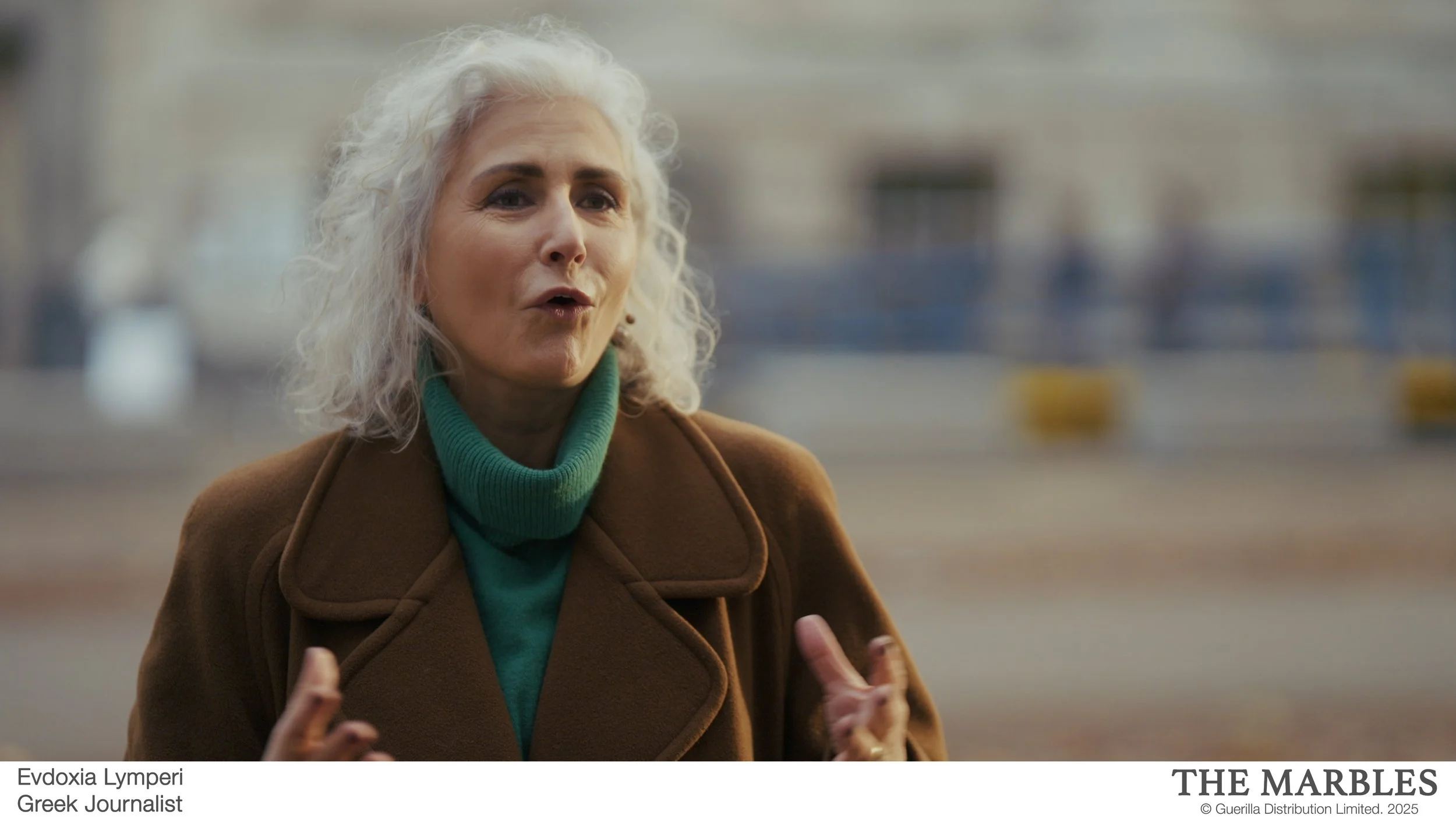
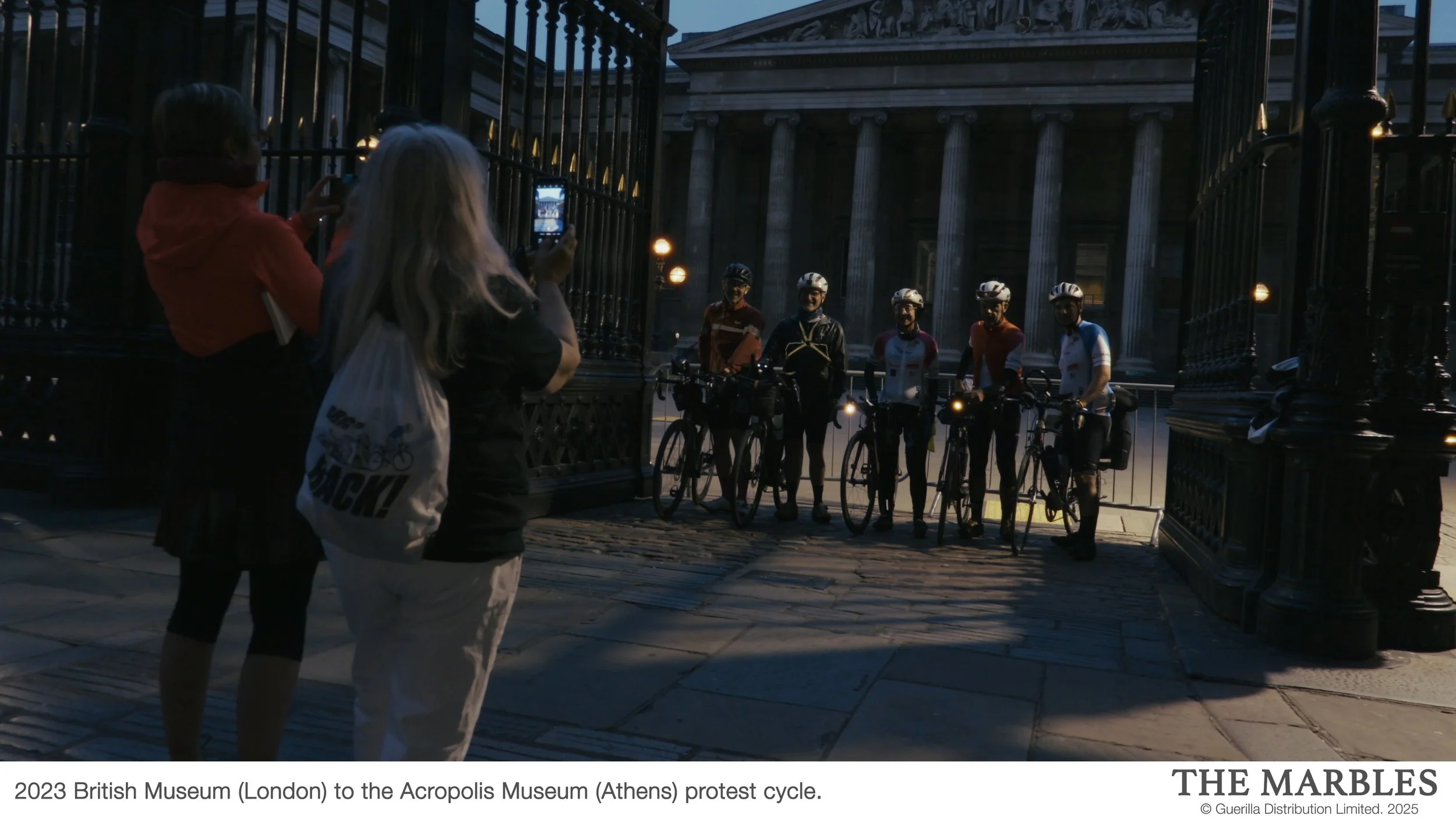
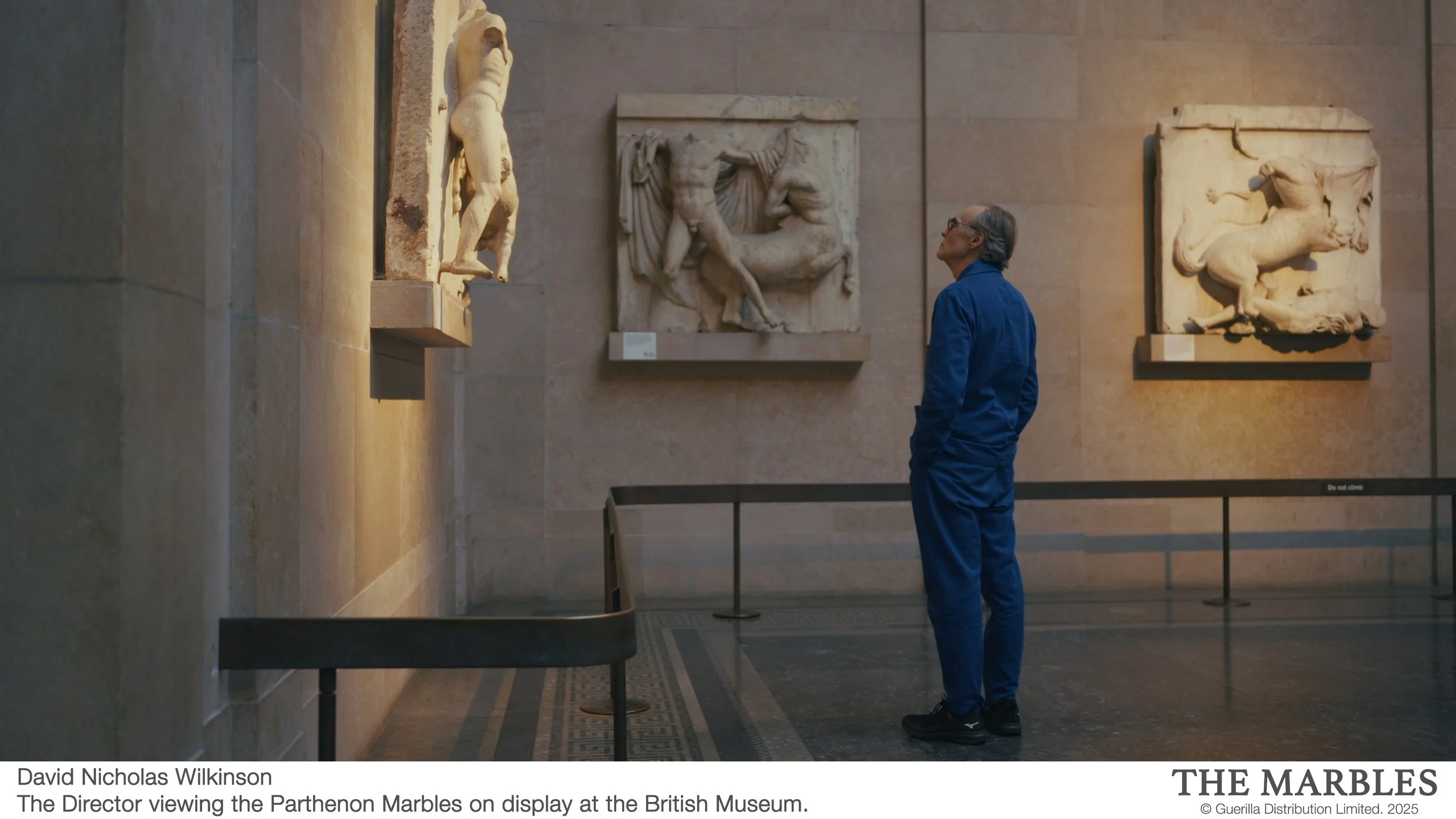
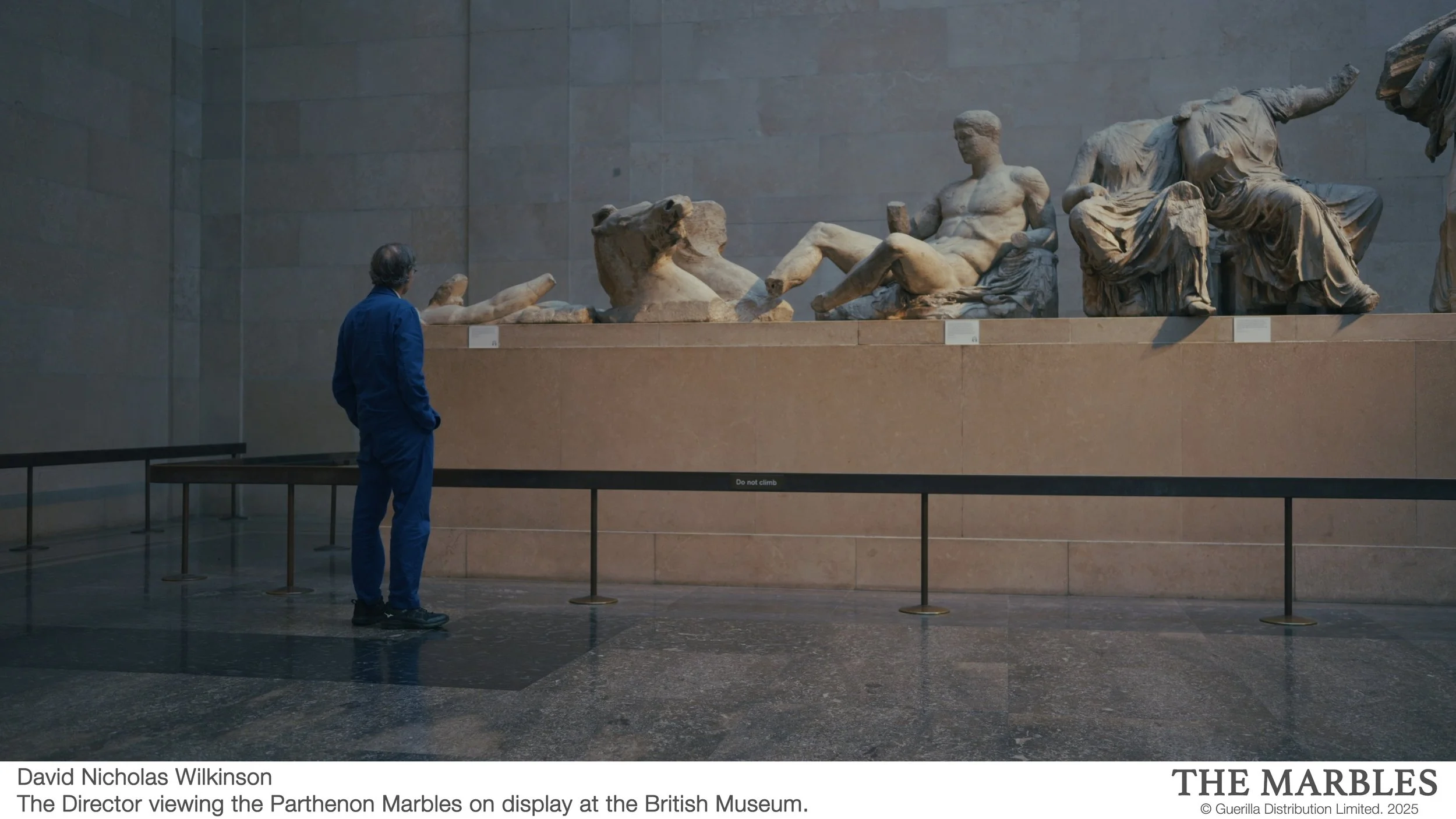
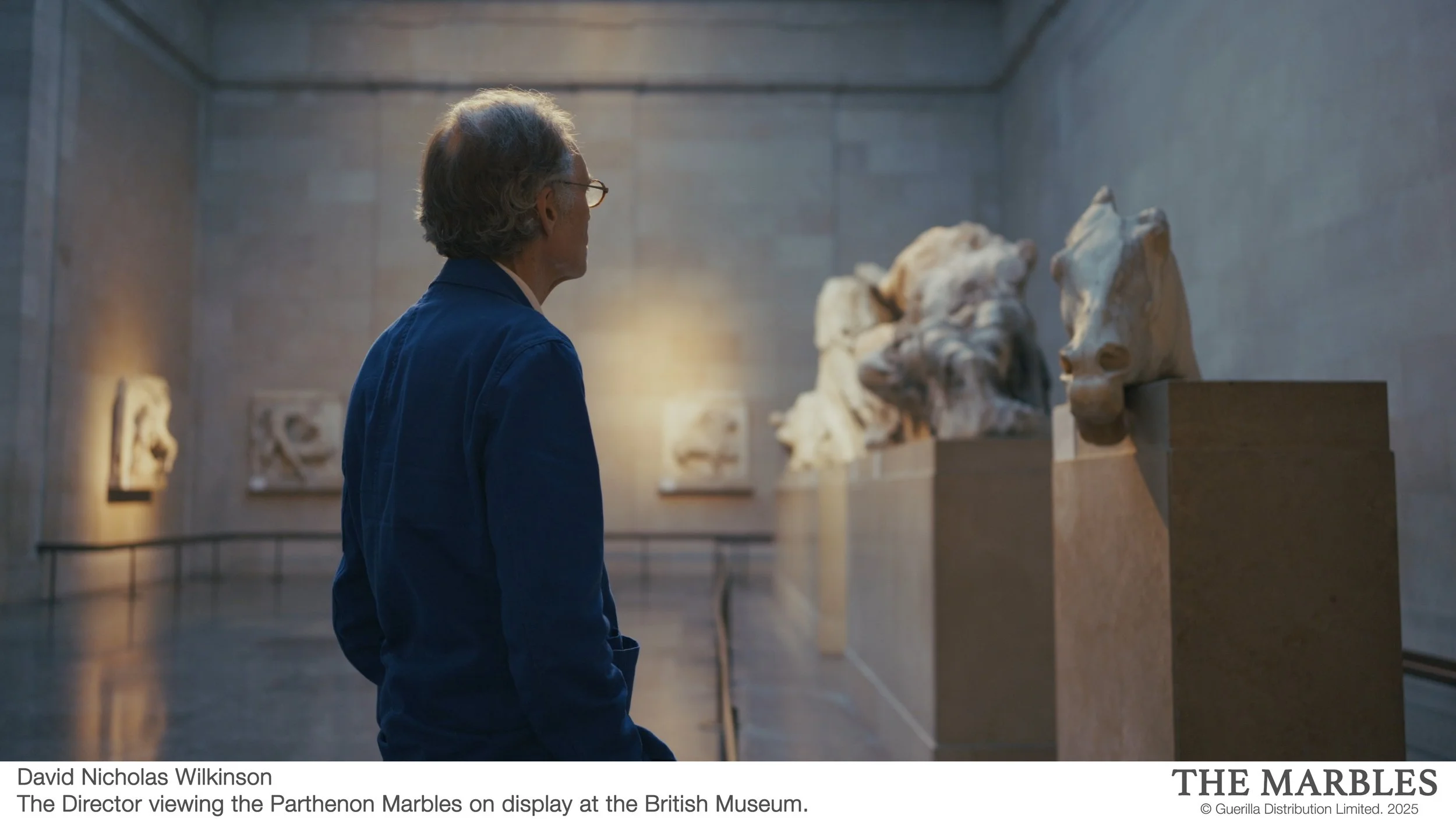
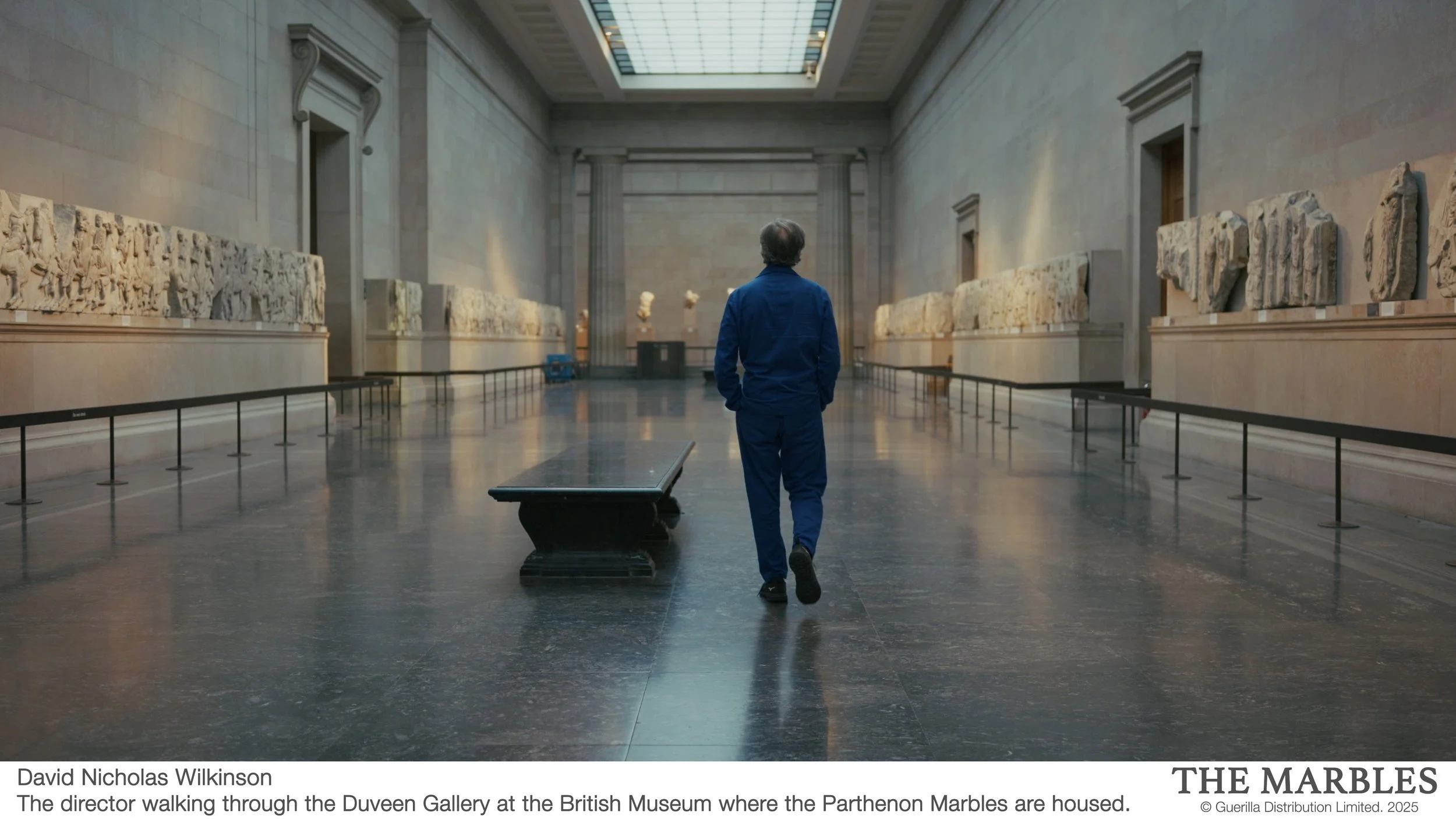
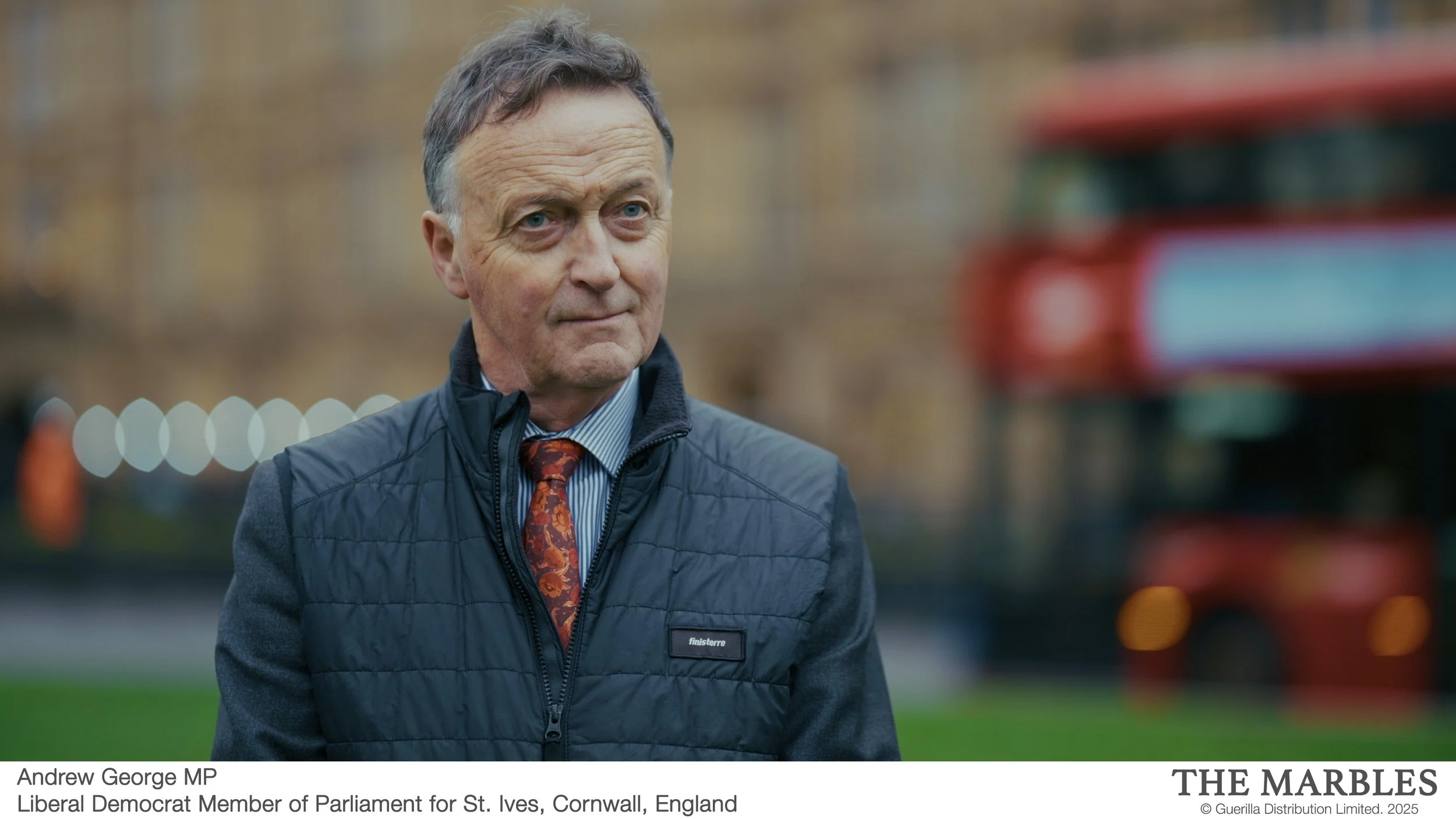
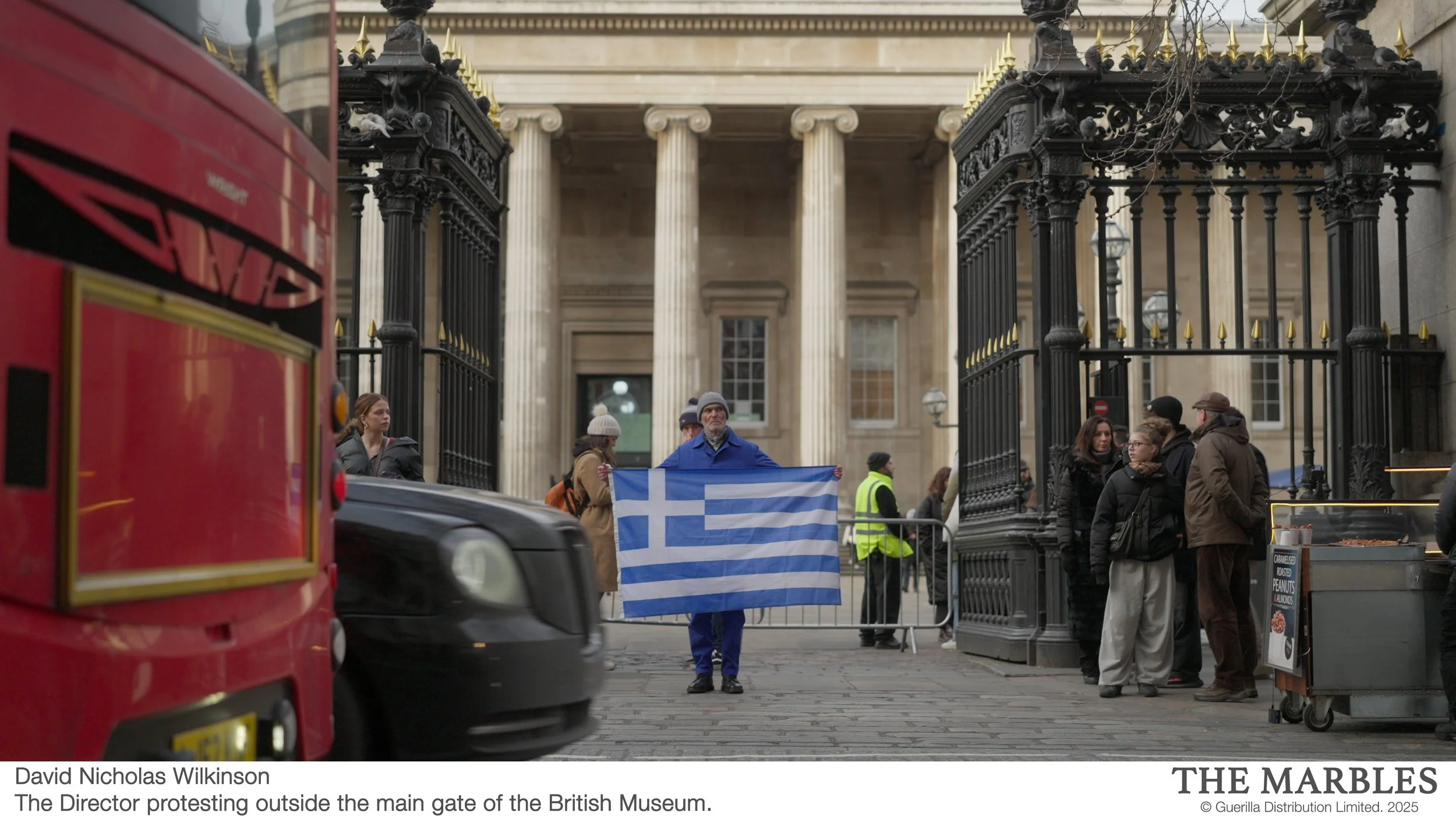
THE MARBLES commenced filming on 25th March 2021, the 200th anniversary of the Greek War of Independence in 1821. It thoroughly examines the case for returning the Parthenon Marbles to Greece, interviewing a wide cross-section of those who actively support the proposition.
As the villain in THE MARBLES is the Scottish-born Lord Elgin, it is somewhat ironic that, after five years of making the film, it turns out that Scotland is actually the hero in the repatriation debate. We claim that Scotland leads the world in returning dubiously acquired artefacts to their countries of origin, and the University of Edinburgh began repatriating artefacts as early as 1947 — making it the first former colonial nation to do so.
On June 6, 2025, The Times published an article regarding the reunification debate. Interestingly, both a No. 10 spokesperson and Kemi Badenoch, leader of the UK opposition party, in responding to questions, referred to them as the Elgin Marbles. How very English – some still refer to them not after the place they were taken, but instead after the thief.
“And last of all, amidst the gaping crew, some calm spectator, as he takes his view, in silent indignation mixed with grief, admires the plunder, but abhors the thief.” – Lord Byron, THE CURSE OF MINERVA
MEDIA & PRESS REVIEWS
★★★★★
“Wilkinson’s excellent film ought to be able to persuade the British government”
★★★★
“many other countries are quietly acknowledging that returning artefacts collected over the years to their original owners is clearly the right thing to do.”
★★★★
“The Marbles doesn’t settle the argument—it reanimates it, forcing us to confront what justice might look like when history itself is in dispute.”
CONTRIBUTORS
(in alphabetical order)
-
Patricia Allan was the Curator of World Cultures at Glasgow Museums from 2002 until 2024. Patricia's research interests include international repatriation, the care of ancestral remains in museums collections, Indigenous cultures and heritage, and post and pre-colonial art and history. She worked on all of Glasgow Museums’ international repatriations from 2002 and was a member of the working group that produced the current guidelines on the Care of Human Remains in Scottish Museums. She now acts as a consultant on the practice, theory and ethics of cultural repatriation. She is a member of Museum Galleries Scotland’s Working Group on Repatriation which aims to develop national guidelines and is on the board of the Commonwealth Association of Museums.
-
Melina Antoniadis is a Canadian lawyer of Greek and Cambodian heritage. She has been admitted to the Bar of Ontario (2020) and the Bar of England and Wales (2024). Melina advises on international law matters and in proceedings before the ICJ, ITLOS and the ECtHR. Melina is the Founder of NOSTOS Strategies, the world's first strategic consultancy on the return of cultural heritage. She is a member of G37 Chambers.
-
Tristram Besterman is a scientist and retired curator, who provides advice and support to UK museums and overseas source communities seeking cultural restitution. During a 40-year career, he developed ethical standards for museums, served on a ministerial working group, and has published extensively in the museum literature. From 1994 to 2005, he was Director of the Manchester Museum, which became a sector leader in innovative cultural engagement.
-
Paul Cartledge is A.G. Leventis Senior Research Fellow of Clare College Cambridge and emeritus A.G. Leventis Professor of Greek Culture in the University. He is a Commander of the Order of Honour (Hellenic Republic) and an Honorary Citizen of Sparti, Greece. He is the author, co-author, editor and co-editor of over 30 books, most recently Thebes and Pericles.
-
Clare Clifford is a jobbing actor, writer, director, and occasional comedian. Her five decades of work in TV, theatre, and film include three series of ANGELS, DOCTOR WHO, THIS LIFE, CASUALTY, DOCTORS, HOLBY CITY, BIRDS OF A FEATHER, six plays at the National Theatre. Her films include PERSONAL SERVICES, MISS POTTER, WISH YOU WERE HERE. She gained an MA in Screenwriting at UAL in 2011. In her screenplay ‘Frieze’, the Greek gods take matters into their own hands, arriving in London to liberate the Parthenon Marbles imprisoned in the British Museum.
-
Brian Cox played the Ancient Greek king Agamemnon in the epic film TROY, one of over 130 films he has appeared in. He has also acted in over 100 television productions, including the worldwide hit series SUCCESSION. Cox began his acting career at age 14 at the Dundee Repertory Theatre in 1961 and is one of the founding members of the Royal Lyceum Theatre, Edinburgh. After graduating from LAMDA in 1965, he has hardly been out of work.
-
Neil Curtis is Head of University Collections at the University of Aberdeen. He has been involved in a number of repatriations, including the return of a sacred bundle to the Kainai Nation (Canada) in 2003 and the first return by a museum of a Benin Bronze, which was presented to the Oba of Benin in 2022. He is chairing Museums Galleries Scotland's Repatriation Working Group.
-
Andrew George MP is a British Liberal Democrat politician. He has been the Member of Parliament (MP) for St Ives in Cornwall since 2024. He previously represented the constituency from 1997 to 2015, when he was defeated. George has served as a member of the Cornwall Council for Ludgvan, Madron, Gulval and Heamoor. He is the Chair of the British Association for the Reunification of the Parthenon Sculptures (BARPS)
-
Alexander Herman is Director of the UK-based Institute of Art and Law and the author of The Parthenon Marbles Dispute: Heritage, Law, Politics (Hart / Bloomsbury, 2023) and Restitution: The Return of Cultural Artefacts (Lund Humphries, 2021). He has been quoted widely in the press on matters relating to the Marbles and appears frequently across television, radio and podcasts discussing restitution.
-
Victoria Hislop is a graduate of Oxford University and the multi-million copy bestselling author of ten novels, including The Island. Her books have been translated into forty languages, and she was executive producer on three of these adaptations for Greek television. Victoria is an honorary Greek citizen and divides her time between England and Greece.
She won a British Book Award in 2007, the Livre de Poche Readers Award 2010 in France, and the Society for Hellenism and Philhellenism awarded the Lord Byron Medal 2025. She is the president of the British School at Athens, Honorary Member of the National Society of Greek Writers.
-
Evdoxia Lymperi is a journalist, communications expert, and media coach. She has been working with the Greek Broadcasting Corporation (ERT) since 2000. Since moving to London as the UK correspondent in 2007, she has extensively covered the repatriation of the Parthenon Sculptures, along with all major UK news stories.
-
Tom Minogue Dunfermline blogger. UK subject/Irish citizen. Outlier in the restitution community.
-
Ioannis Raptakis has a long and distinguished diplomatic career. At the time of filming, he was Greece’s ambassador to the United Kingdom. He also served as Ambassador to Vietnam and Laos, India, Sri Lanka, Nepal, Bangladesh, and the Maldives. He also served as Consul General in Sydney, Australia and Bucharest as well as Consul in Perth, Australia. After joining Greece’s Ministry of Foreign Affairs in 1985, he served as Deputy Head of Embassies in Buenos Aires and Dublin. He was a Permanent Representative to the International Maritime Organization and has led diplomatic work in areas including bilateral relations with Southeast European countries, common foreign and security policy, EU law, economic and monetary policy, and Justice and Home Affairs.
-
Dominic Selwood LLB, DEA, DEJ, DPhil, FSA, FRHistS is a historian, journalist, author and barrister. He is a fellow of the Society of Antiquaries and the Royal Historical Society and a member of Lincoln’s Inn. He has a masters from the Sorbonne and a doctorate from Oxford in history. He served in the British Army (reserve) retiring as a Captain. He is the author of numerous best-selling books, most recently Anatomy of a Nation: A History of British Identity in 50 Documents. He is a regular presenter on Mysteries of the Abandoned and Forbidden History.
-
Mark Stephens is the UK's foremost Art & Cultural Property lawyer, who works at Howard Kennedy LLP. Mark has worked on the Marbles case for the past 14 years. He has also acted in numerous Nazi-looted art claims as well as the return of cultural artefacts. A former chair of the International Bar Association Art & Cultural Property committee he has represented governments, cultural institutions and galleries as well as claimants. He is also known for his work for Tasmanian Aboriginal peoples, the Indigenous peoples of Rapa Nui (Easter Island) and for acting for the US government in the return of the looted Bhima statue from the Norton Simon Museum to the Koh Ker site in Cambodia.
-
Dr Christopher Stockdale, M.B. Ch.B. Primary FRCS 1969, MBE, qualified from Birmingham Medical School in 1967 and enjoyed thirty-two f years as a Family Doctor, ENT surgeon, renal shunt surgeon and Orthopaedic assistant surgeon to Mr John Polyzoides. He is a proud member of BCRPM, a Paul Harris Fellow and was inducted into the International Marathon Swimming Hall of Fame in 1991.He is passionate about the safety of open water swimmers and has recently published an essay, ‘In The Shadow Of Peril’. He is an Honorary Citizen of the Aegean and Forio D’Ischia, Italy. He has written an autobiography, ‘Swimming with Hero’.
-
Janet Suzman, Chair of the British Committee for the Reunification of The Parthenon Marbles, is an Associate of the Royal Shakespeare Company, where she spent ten years playing most of the major roles, culminating in a notable Cleopatra, and was made Dame Commander of the British Empire in 2011 for services to the theatre. She has an Academy Award Nomination for Best Actress, playing Empress Alexandra of Russia, and has twice won the Evening Standard Best Actress Award. She broke the Equity boycott by directing Othello in Johannesburg in 1987 where she was born and raised. She developed early on a passionate dislike of injustice in any form, and readily responded to supporting the return to their rightful home of the shadily acquired Parthenon Marbles. The much admired advocate George Bizos was her South African role model in this respect.
-
Guo YU served as the First Secretary at the Cultural Office of the Chinese Embassy in London, where he acted as the Embassy's primary liaison for the repatriation of the Tiger Ying.
Lord Byron Voice Over
Paul McGann
Scottish Woman Voice-Over
Miriam Margolyes
Hartwig Fischer Voice-Over
Sebastian Heckmeier
Wounded Knee Memorial Voice-Over
Chief Dave Bald Eagle
Scottish Government Spokesperson
Shian Denovan
UK Government Spokesperson
Ruby Crepin- Glyne
Boris Johnson
Jonathan Guy Lewis
Artefacts Voice Over
Janet Suzman
DIRECTOR’S STATEMENT
A Personal Statement from Director David Wilkinson
In the grand scheme of things, returning the Parthenon Marbles is a relatively minor issue. However, in a fractured and divided world, we must value friendly nations with whom we share many commonalities and treat one another with respect. Greece is a friend to the UK, but we are not showing this friend the esteem and decency they deserve. After more than 200 years, it is time to correct a historic wrong and “do the right thing.”
In 1976, I was at the bar in the Westside Health Club on London’s Kensington High Street with a group of fellow members. Most of us were out-of-work actors, complaining about the limited activities available during the day without spending any money. This was long before 24-hour television. Andrew Alexander, who was then a political commentator for the Daily Mail and would later become a director of one of my companies, suggested that we attend the lunchtime lectures at the British Museum. Not one of us had ever heard of them.
Andrew told us that the Daily Telegraph published details of each day's events. I took this advice and started attending many of them. Although some of the events were dull, the ones that intrigued me most were those about Ancient Greece, which eventually led me to question why the Parthenon Marbles remained in the British Museum.
A few years later, while discussing this with David English, he mentioned that, privately, he believed they should perhaps be returned, but added that, speaking as the editor of the Daily Mail, they must remain because the British Museum was by far the best place for them. (A similar statement was made to me much later by the then-serving Trustee of the British Museum—the private and public thoughts conflicting.)
Andrew Alexander, who was also present with David English, stated he could not care less whether they were stolen or not, considering that irrelevant. He argued that “we” had them and “we” would keep them—essentially the finders-keepers mentality.
Later, whenever I discussed the reunification argument with various British people throughout the 1970s, 1980s, and 1990s, most believed they should stay. Then, from around 2008 onward, when I started working on this film, I found that most British people had become sympathetic to their return.
I began filming on 25th March 2021, and many of my friends, including key members of THE MARBLES production team, questioned why I was making a film (and using my own money) on such a dry subject that would only interest a small number of intellectuals. However, over the past two years, the return of artefacts of dubious origin has gradually become a matter of the utmost urgency within the arts and museum community. Undoubtedly, the number of articles in the press, not only in the United Kingdom but also in many former colonial countries, has increased markedly.
Furthermore, the fact that no filmmaker or television producer has ever made a film explicitly examining the UK and its rights of possession regarding the Parthenon Marbles posed a challenge in itself.
Since the Parthenon Marbles are still housed in the British Museum, I am fully aware that I have finished my film somewhat prematurely. When I started filming, I had COVID hair and a large, unkempt beard, but I finished it with chemo hair and a reluctantly shaved-off beard with the whisper of ‘Time Waits For No Man’ ringing in my ears; I had to complete THE MARBLES while and how I could.
-
Director/producer/writer David Wilkinson directed, produced, co-wrote, and presented THE FIRST FILM, POSTCARDS FROM THE 48%, and was an executive producer of HOW TO CHANGE THE WORLD. His three-hour Holocaust documentary GETTING AWAY WITH MURDER(S) was voted by the Guardian the No17 Best Film in 2021 in the UK. By default, it was the highest-placed documentary on the list.
He has also produced almost 50 documentaries and dramas. Wilkinson has also distributed 120 films in the UK and Ireland in the cinema, on video/DVD, on television, and online. Since 1998, apart from Alex Gibney’s ZERO DAYS and Lasse Hallström’s HILMA, these have been purposely only British and Irish films.
He started his career as an actor in 1970, and for the next ten years, he acted in over 40 theatre, television and film productions. In 1982, he became, by accident, the first true independent producer to work with the BBC with a film of Virginia Woolf's TO THE LIGHTHOUSE, which starred Sir Kenneth Branagh and was nominated for a BAFTA award.
BEHIND THE CAMERA
-
Don McVey was the DOP on Wilkinson’s THE FIRST FILM, POSTCARDS FROM THE 48% GETTING AWAY WITH MURDER(S), and now THE MARBLES. He has shot commercials for companies such as Cadbury’s, Lego, Aspinall, Amnesty , and 3 Mobile. He has worked with artists such as Little Mix, Take That, Robbie Williams , and Ellie Goulding, and won a Best Cinematography Advertising award for a Malaria charity spot with Stephen Mangan.
-
David Hughes BFE is a versatile TV & Film editor with over a decade of experience working on documentary and factual projects for leading independent production companies, networks and streamers, including Netflix, BBC, ITV, Channel 4, Channel 5, Sky, Discovery, Vice, A&E Networks and more. He first worked with David Wilkinson on THE FIRST FILM and now THE MARBLES.
-
Christopher Barnett has scored independent films, including the BAFTA-nominated A COCK & BULL STORY, BORROWED TIME, and Wilkinson’s GETTING AWAY WITH MURDER(S), POSTCARDS FROM THE 48%, and THE FIRST FILM, which received media best score awards. His work also includes, SPEER GOES TO HOLLYWOOD, nominated best score at the IDA awards, and music for brands like Madam Tussauds, London Eye and Amnesty International.
-
Emlyn Price has worked with David Wilkinson for 30 years. Their productions include POSTCARDS FROM THE 48%, CHARLES DICKENS’S ENGLAND, GETTING AWAY WITH MURDER(S) and now THE MARBLES. They also co-wrote a screenwriting book they wrote with Sir Ronald Harwood and has written several unproduced screenplays with David Wilkinson.
-
Kate Charles is a London-based New Zealand lawyer, working primarily in scripted television. Kate has supported David with Business Affairs matters since 2019.
-
Art Dimopoulos is theExecutive Director at National Hellenic Society in Washington DC.
-
Nick Drossos is a healthcare scientist with 38 years of experience in the industry. Born and currently residing in Melbourne Australia, he grew up in Greece, and takes pride in his Greek heritage, Hellenic history, and culture. Throughout the years, he has actively engaged in many organisations and community groups. He is a member of the Australian Parthenon Committee and AHEPA Victoria, where he campaigns for the Reunification of the Parthenon Sculptures and Caryatid.
-
Bill Lawrence worked with David Wilkinson on THE FIRST FILM, POSTCARDS FROM THE 48%, GETTING AWAY WITH MURDER(S) and THE MARBLES. He was the Head of Film at the National Media Museum in Bradford and a board member of both Screen Yorkshire and Creative England (and a member of its Investment Board). He is also a co-owner of the Bradford Literature Festival and Finance Director of the Manchester Animation Festival.
-
Amaryllis Roberts is also a costume designer. She has been nominated for ten BAFTA Awards, winning four of them; nominated for five EMMY Awards, winning two of them; and nominated for many other awards, occasionally winning them. Her most recent productions include THE CROWN, H IS FOR HAWK and THE SEVEN DIALS MYSTERY. She was also an Executive Producer of GETTING AWAY WITH MURDER(S).
-
Tudor Davies has worked with David Wilkinson on THE FIRST FILM, POSTCARDS FROM THE 48%, GETTING AWAY WITH MURDER(S) and now THE MARBLES. His sound career started at BBC Television Centre in 1991, working on comedy, music and drama. Having left to go freelance, he now specialises in documentaries and music programmes, having won a BAFTA as part of the sound team for LATER WITH JOOLS HOLLAND. He runs his own post-production studio in West London.
-
Sara Mitchell has worked with David Wilkinson for 26 years on well over 100 film posters, DVD covers, and other artwork. She has also provided graphic designs and posters for Wilkinson films, POSTCARDS FROM THE 48%, THE FIRST FILM, and GETTING AWAY WITH MURDER(S).
PAST SCREENINGS
Central Scotland Documentary Festival (CSDF) Opening Night Film, a Macrobert Arts Centre Stirling World Premiere - 30 October
Everyman Cinema (Barnet) - + Live Director Q&A 6 November
The Garden Cinema - + Live Director Q&A 7, + Live Director Q&A 8, 10, 12, 20, 22, 24 November
Genesis Cinema - + Live Director Q&A 7 November
Campus West Cinema - 7, 10, 11, 13 November
Showcase Cinema de Lux Glasgow - 7, 9 November
Chapter Arts Centre - 8, 11, 12, 13 November
ActOne Cinema - + Live Director Q&A 9 November
ArtHouse Crouch End - + Live Director Q&A 9 November
Zeffirellis - 11, 12, 13 November
The David Lean Cinema - + Live Director Q&A 13 November
Tyneside Cinema - 14, 17 November
Tavistock Wharf - 28 November 2, 3, 4 December
The Dukes - 30 November
Wotton Electric Picture House - 4 December
Derby QUAD - 5, 11 December
Plymouth Arts Cinema - 6, 9, 10 December
Showroom Cinema - 8 December
Ilkley Cinema - 9, 10, 11 December
The Barn Cinema - 11, 12 December
Totnes Cinema - 13, 19 December
The Chiswick Cinema - 14 December
Midlands Arts Centre - 15 December
Lewes Depot - 15 December
Cambridge Arts Picturehouse - 18 December
The Flavel Arts Centre - 7 January
The Birks Cinema - 11 January



